News and Announcements
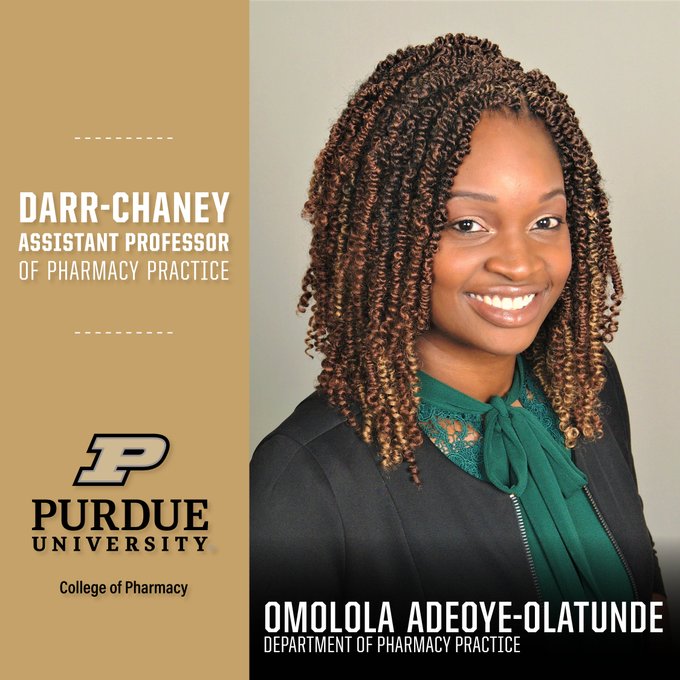
Congratulations to Dr. Omolola Adeoye-Olatunde, who has been named the Darr-Chaney Assistant Professor of Purdue College of Pharmacy.
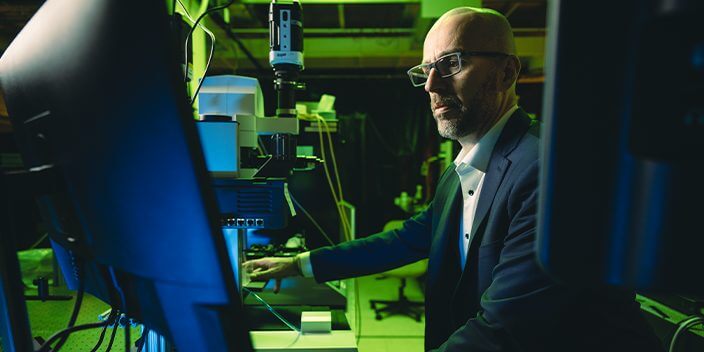
Dr. Pavlos Vlachos is awarded rare honor from the American Heart Association
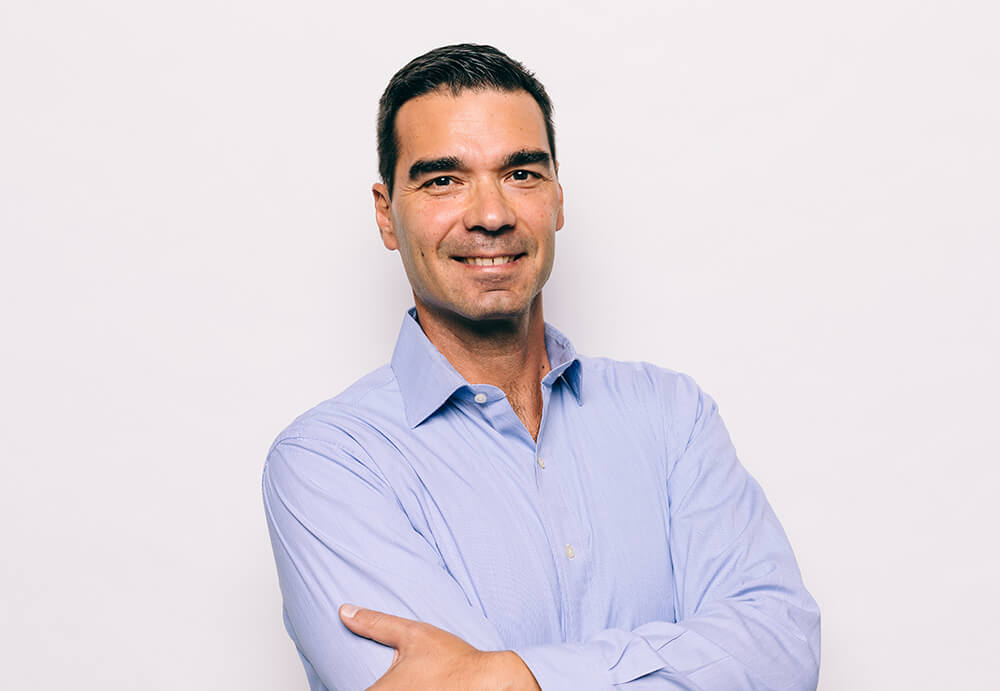
RCHE Faculty Leadership member Petros Drineas named Fellow by the Society for Industrial and Applied Mathematics
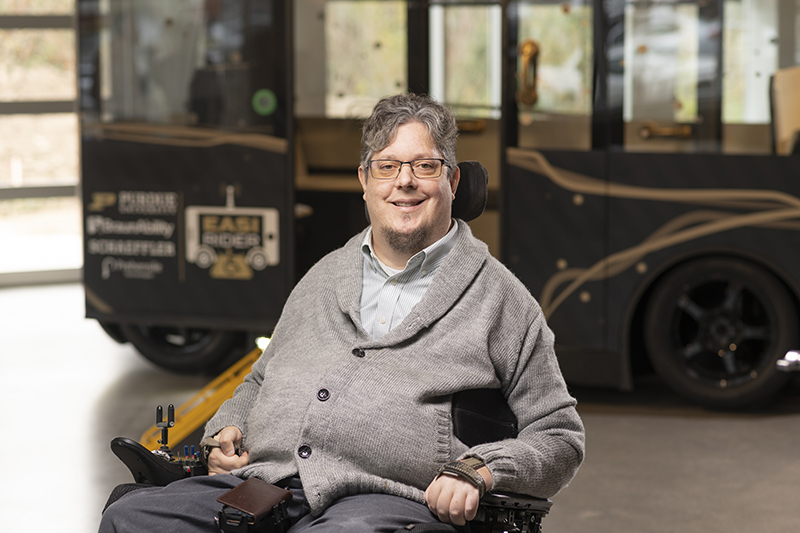
RCHE Faculty member Brad Duerstock wins first place in the US Dept. of Transportation's Inclusive Design Challenge
Updates from the Regenstrief Center for Healthcare Engineering
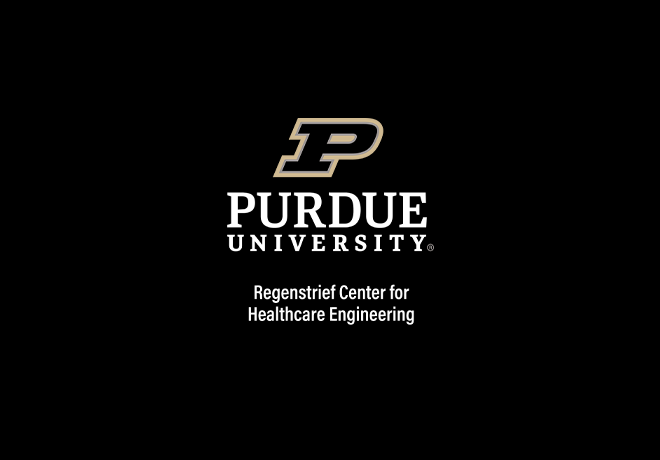
In an effort to better align our resources and strengthen the services that we provide to our stakeholders and communities, we have re-envisioned the Purdue Healthcare Advisors and the re-allocation of services directly through RCHE and the Purdue Technical Assistance Program (TAP). The Purdue led portion of the I-HOPE program and health equity analysts will remain with RCHE under the guidance of Holly Wood. Quality and lean services have become part of HealthTAP, formerly healthcare TAP, a reconfigured organization overseen by Mat Trampski. HealthTAP will continue the PHA legacy by providing technical assistance throughout the state for entities in the healthcare system. These decisions were made after much evaluation and consideration in an effort to better position RCHE for continued success and greater impact in developing a proactive, patient-centered, and wellness-focused healthcare delivery system.
To connect with RCHE or I-HOPE staff, please email rche@purdue.edu.
To connect with TAP, Quality/Lean services, or CORE-ECI staff, please visit https://tap.purdue.edu.
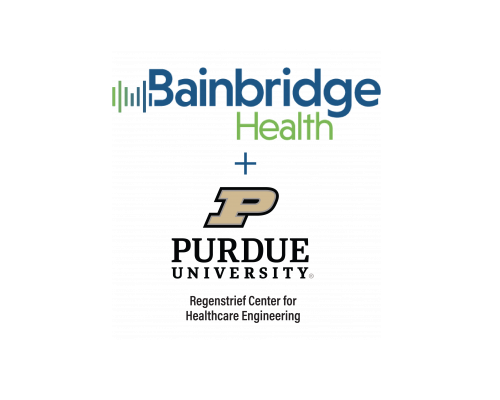
Bainbridge Health and Purdue University Collaborate to Advance the Infusion Pump Industry
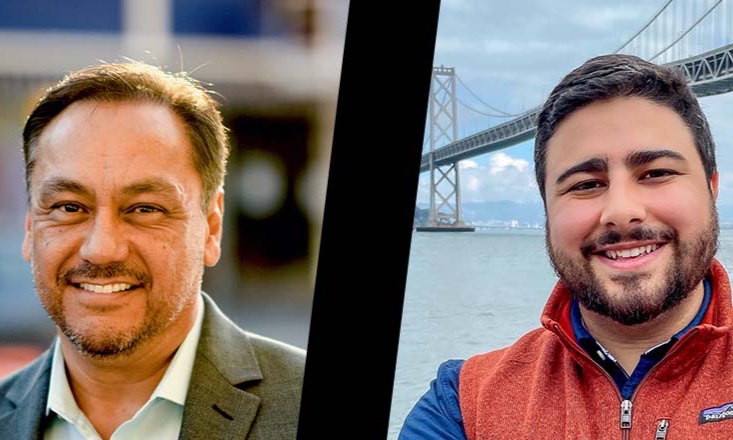
Purdue entrepreneurship fellows assist health care technology acceleration

Purdue growing research and outreach to deliver on-the-ground health care solutions
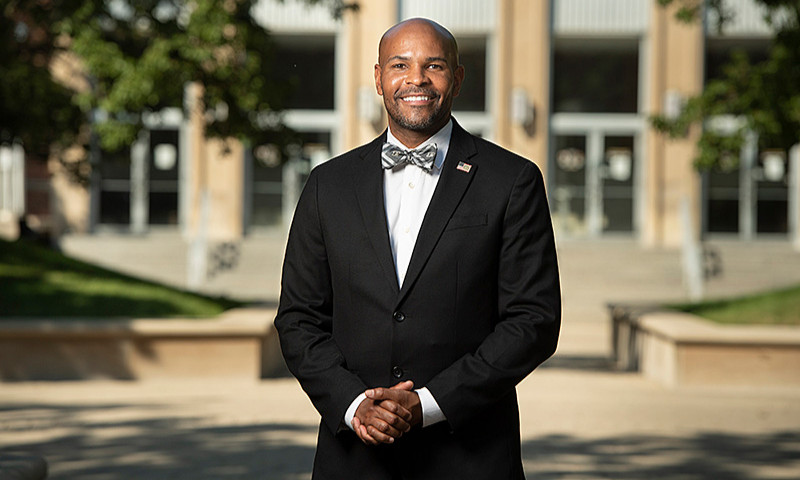
Former U.S. Surgeon General Dr. Jerome Adams to Lead Health Equity Initiatives at Purdue
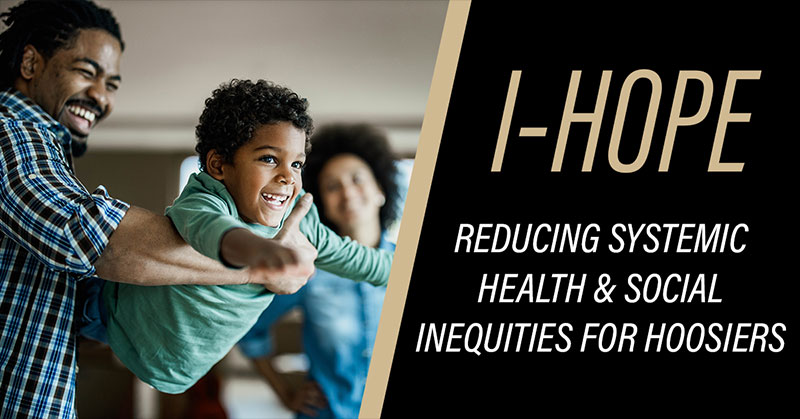
Purdue partners with the state to improve post-pandemic public health

Purdue's Regenstrief Center and IU Health to lead fight against opioids in two Indiana communities
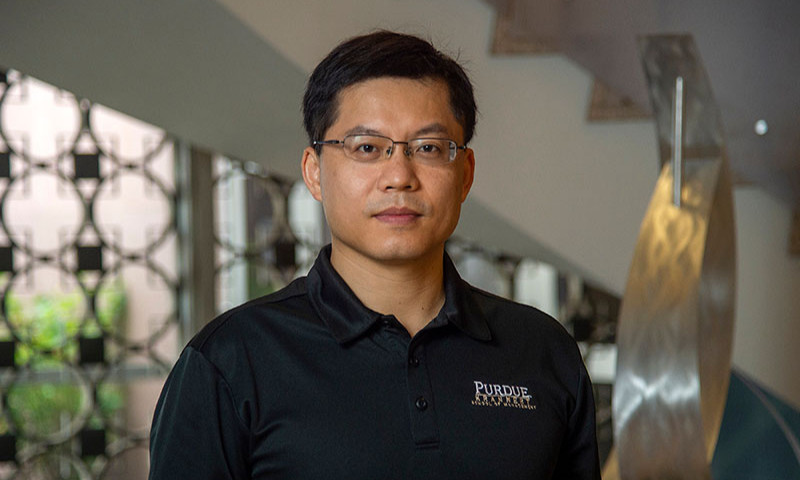
Faculty affiliate of the Regenstrief Center for Healthcare Engineering named first Innovation and Entrepreneurship in Krannert School of Management
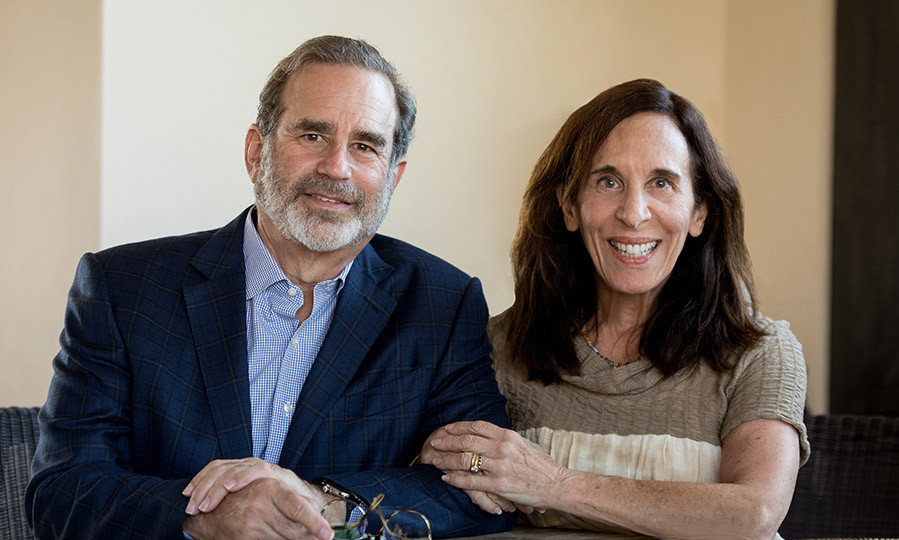
Sigals Establish Rising Star Professorship in Industrial Engineering
Krannert and Kelley business schools collaborating to help IU Health manage surge of Covid-19 patients
Purdue Engineering-IUSM healthcare analytics approach can help hospitals forecast COVID-19 demand, prepare for future outbreaks
RCHE seeks Software & Cloud Computing Engineer
Regenstrief Center for Healthcare Engineering (RCHE) is announcing a search for a Senior Software Engineer/Cloud Computing Engineer with the goal of creating a state of the art data architecture for extensive health data such as electronic health records (EHR), wearable devices, among others. The data platform would be used for cutting edge solutions for advanced machine learning and artificial intelligence applications with a goal of developing a new paradigm for evidence-based medicine. To learn more and apply visit: https://careers.purdue.edu/job/West-Lafayette-Senior-Software-Engineer-IN-47906/668991200/?locale=en_US
RCHE Summer Undergraduate Research Fellow

Makayla Roma is a rising senior at the University at Buffalo majoring in Industrial Engineering, Economics, and Political science. She joined RCHE as a Summer Undergraduate Research Fellow (SURF) this summer.
Makayla was mentored by Dr. Paul Griffin and also worked with Dr. Ping Huang and Jennifer Leising. Her research focused on determining the impacts of state home and community based service (HCBS) waiver policies on patient outcomes. The data used in her analysis is from the state Medicaid population, and inpatient costs and readmission rates are used as output measure. The goal of the research is to determine which state policies regarding the implementation of HCBS waivers result in decreased costs, while at the same time maintain quality of care.
Makayla hopes to continue her studies and obtain a PhD where she will be able to continue researching various areas of healthcare using an engineering approach.
RCHE announces scholarship winners for the 2020 academic year
Regenstrief Center for Healthcare Engineering announces its scholarship winners for the 2020-2021 academic year. Meet this year’s Regenstrief Scholars.
Purdue Engineering-IUSM healthcare analytics approach can help hospitals forecast COVID-19 demand, prepare for future outbreaks
Purdue Engineering-IUSM healthcare analytics approach can help hospitals forecast COVID-19 demand, prepare for future outbreaks
Purdue Engineering experts are collaborating with Indiana University School of Medicine (IUSM) colleagues to develop and implement a simulation model to help a major Indianapolis hospital overcome a key challenge in providing necessary care to all COVID-19 patients in need. The impact of this innovative healthcare analytics approach could extend to healthcare organizations in additional cities and countries and to other disease outbreaks.
In Indianapolis, as well as New York and many other cities, acute-care hospitals have been struggling to accurately forecast demand for intensive care unit (ICU) beds and ventilators, along with related staffing and supplies, during the COVID-19 pandemic. Hospitals and other types of healthcare organizations, such as nursing homes, also are grappling with how to cope with admission surges.
The better a hospital, for example, can pinpoint needs in advance, the more efficiently it can serve patients. But the task requires planning to allocate the right quantity of resources at the right time to each patient population subgroup – resulting to more lives saved, fewer readmissions, and better outcomes for survivors.
Analytics gap
Unfortunately, a gap in analytics capability has been thwarting these efforts, says Nan Kong, PhD, associate professor in the Weldon School of Biomedical Engineering at Purdue University, who is leading a project to benefit IUSM-supported Sidney & Lois Eskenazi Hospital, the flagship medical center for Eskenazi Health, founded in 1859 as Indiana’s oldest public health system.
“Amid volatile and uncertain conditions, and without good understanding of the disease transmission and progression, it has been very difficult for hospitals to precisely predict what resources they’ll need to address the COVID-19 needs,” Kong says.
“That’s largely because most models being used are based on aggregated public health data, on a state or country level, and don’t incorporate hospital- and patient-specific characteristics. Knowing how many people in a geographic area will be infected and how many will die isn’t that helpful to a hospital CEO. Rather, it’s critical for a hospital to receive a steady flow of timely, reliable and directly relevant information.”
Forecasting ICU bed, ventilator demand
In collaboration with IUSM and Eskenazi staff, the Purdue researchers have developed and calibrated a baseline model focused on forecasting daily demand for ICU beds and ventilators, which can help Eskenazi assign staff and allot supplies for the near future. A web app will be launched shortly to facilitate information sharing with hospital leadership.
“Our stochastic simulation model-based health analytics approach differs from what’s out there in that it is grounded on granular, real-world data collected in a timely manner from Eskenazi patients’ EHRs (electronic health records),” Kong says. “Our model enables predictions regarding two important variables with quantified confidence: 1) the number of patients who have been hospitalized and tested positive for COVID-19 but are not on ventilators, and 2) the number of COVID-19 patients on ventilators.”
The model further takes into account such factors as a patient’s length of stay, gender, age, and underlying conditions.
The project team includes Zhouyang Lou, a PhD student in Purdue’s School of Industrial Engineering, who is co-supervised by Paul Griffin, PhD, director of Purdue’s Regenstrief Center for Healthcare Engineering. These Purdue team members are collaborating with Christopher Callahan, MD, chief research and development officer of Eskenazi Health; Randall Grout, MD, MS, FAAP, research informatician and pediatrician at Eskenazi Health; and Wanzhu Tu, PhD, professor of biostatistics at IUSM.
The team is drawing on previous experience of Kong, the principal investigator for the interdisciplinary Purdue Biometrical Analytics and Systems Optimization Research Lab, in improving business analytics capabilities for healthcare organizations.
“Transformative impact”
Kong foresees broad applications of his team’s inventive work with Eskenazi and IUSM.
"Our provider-based approach could have a transformative impact, making healthcare organizations more resilient in rapidly-changing, uncertain times," Kong says.
“Precision health based on systems dynamics modeling could benefit hospitals and nursing homes, among various healthcare organizations, throughout the United States and in other countries, including in cities that haven’t reached COVID-19 peaks. Beyond responding to the current pandemic, models tailored to a particular healthcare organization have the power to help address subsequent waves of the novel coronavirus and manage other pandemics more proactively and effectively.”

Excellence in Instruction Award for Lecturers: Dan Degnan
Paper device could bring portable coronavirus detection, but funding bars production
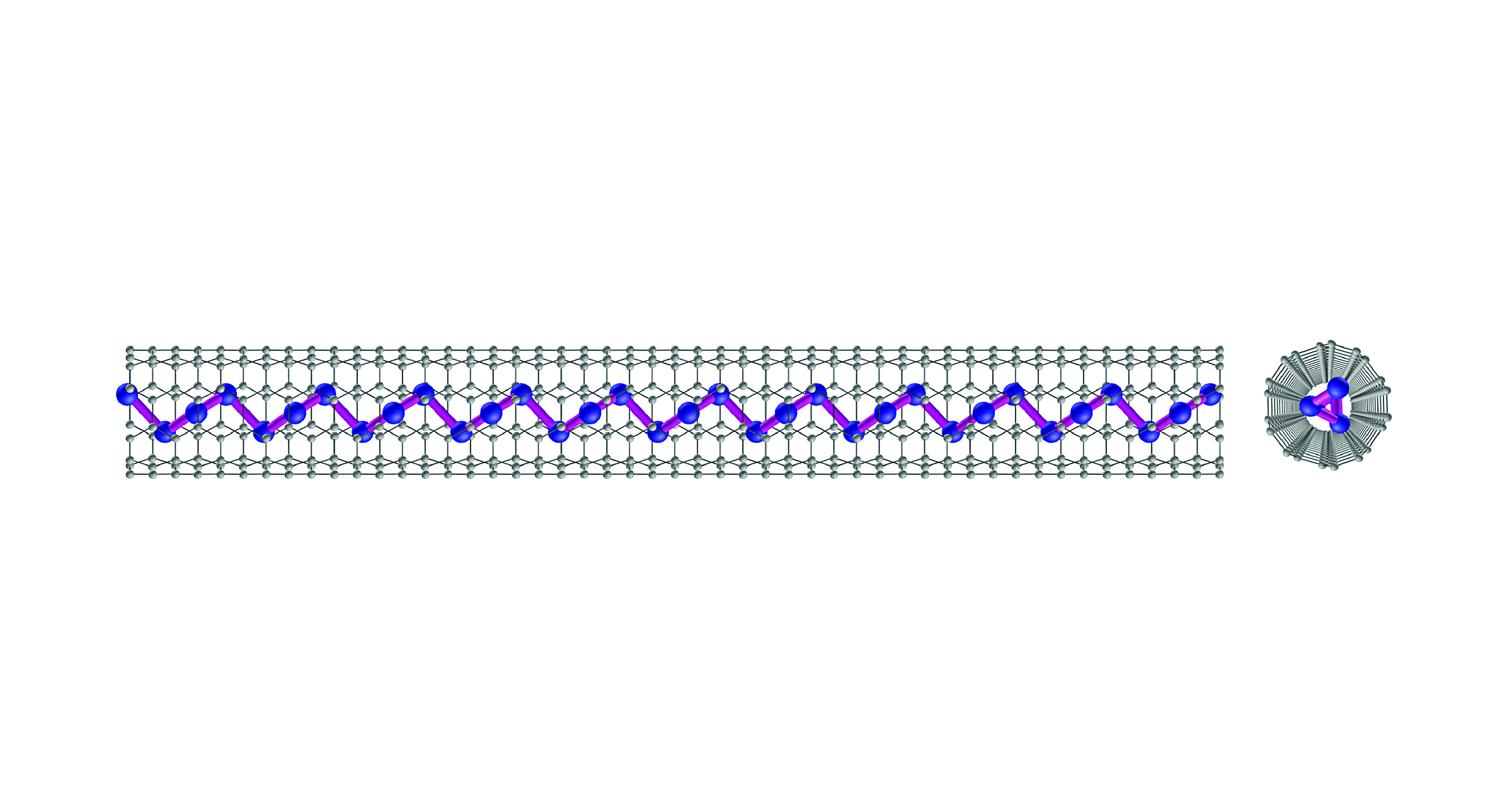
DNA-like material could bring even smaller transistors
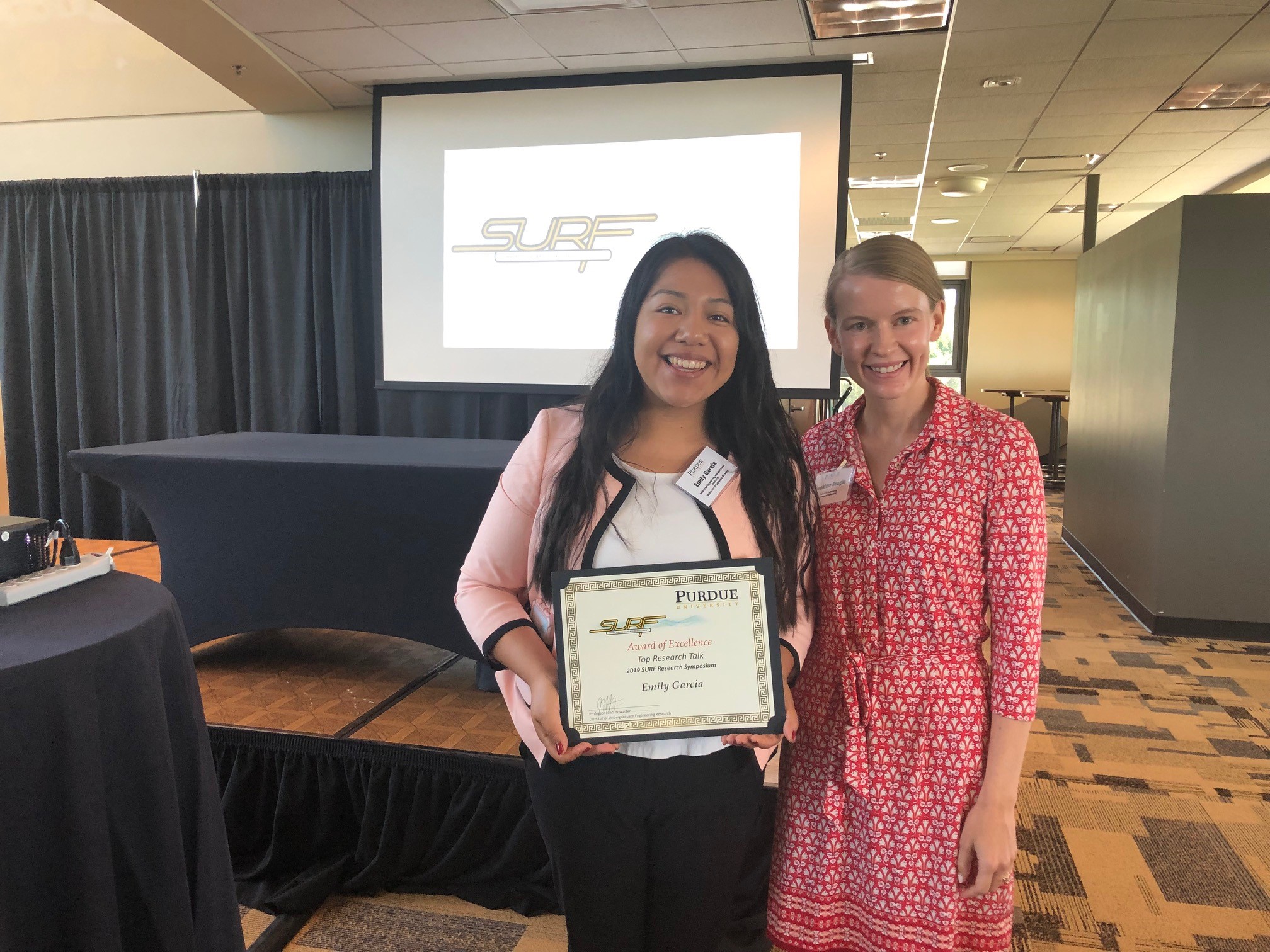
Emily Garcia: Undergraduate Research Experience with SURF

Edible ‘security tag’ to protect drugs from counterfeit
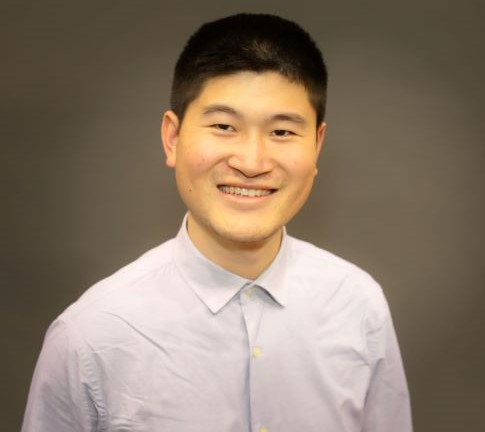
Three Engineering graduate students named first-ever Teaching Fellows

Recognizing Outstanding Engineering Teachers for Summer and Fall 2019

2019 Article of the Year - Congratulations to Vicki Simpson and Zachary Hass for the selection of their article, “Individual health outcomes secondary to a nurse-led coalition-based health promotion program for underserved diverse populations”.
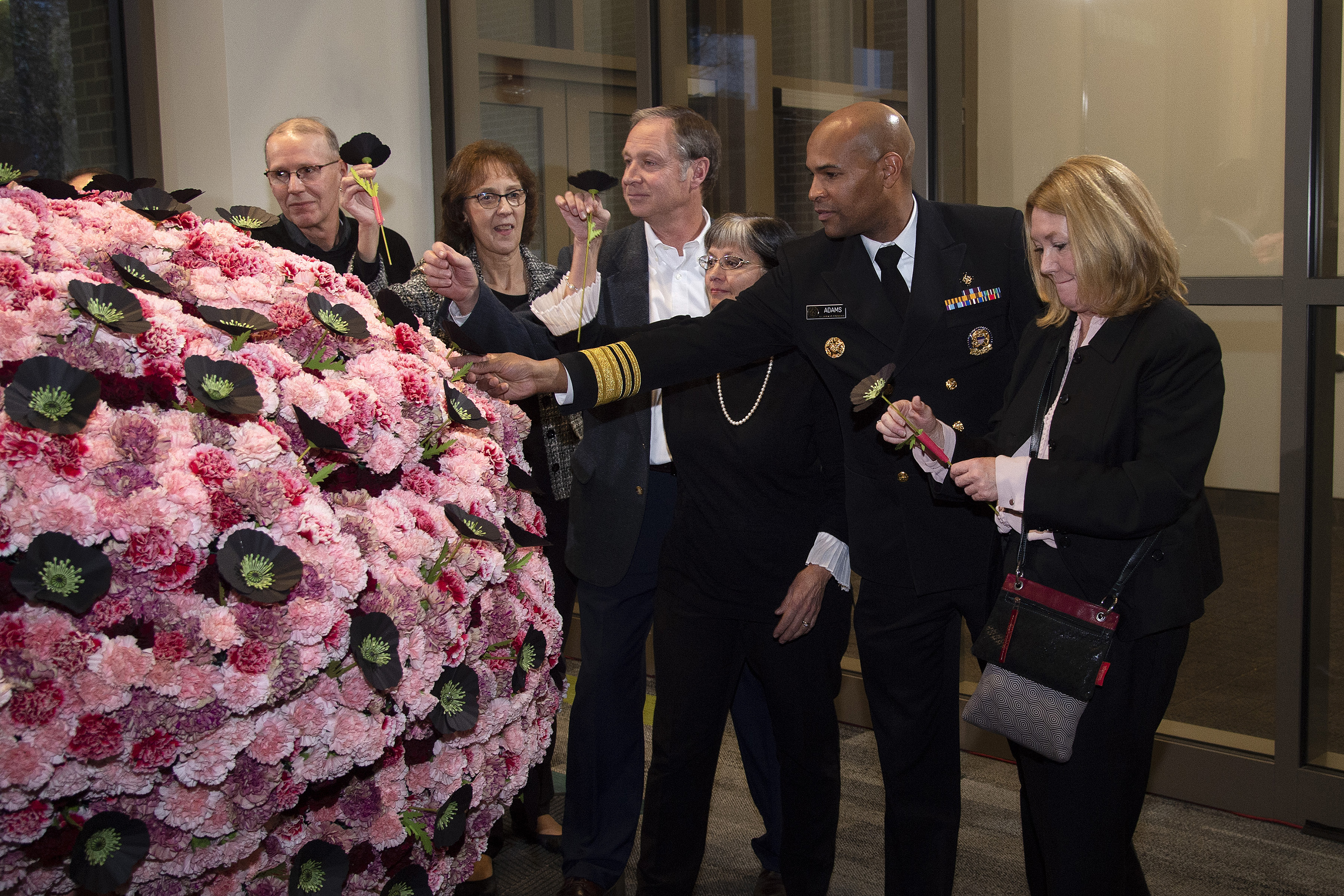
‘Hope Stems’ blooms at Purdue, raising awareness on addictions, substance use
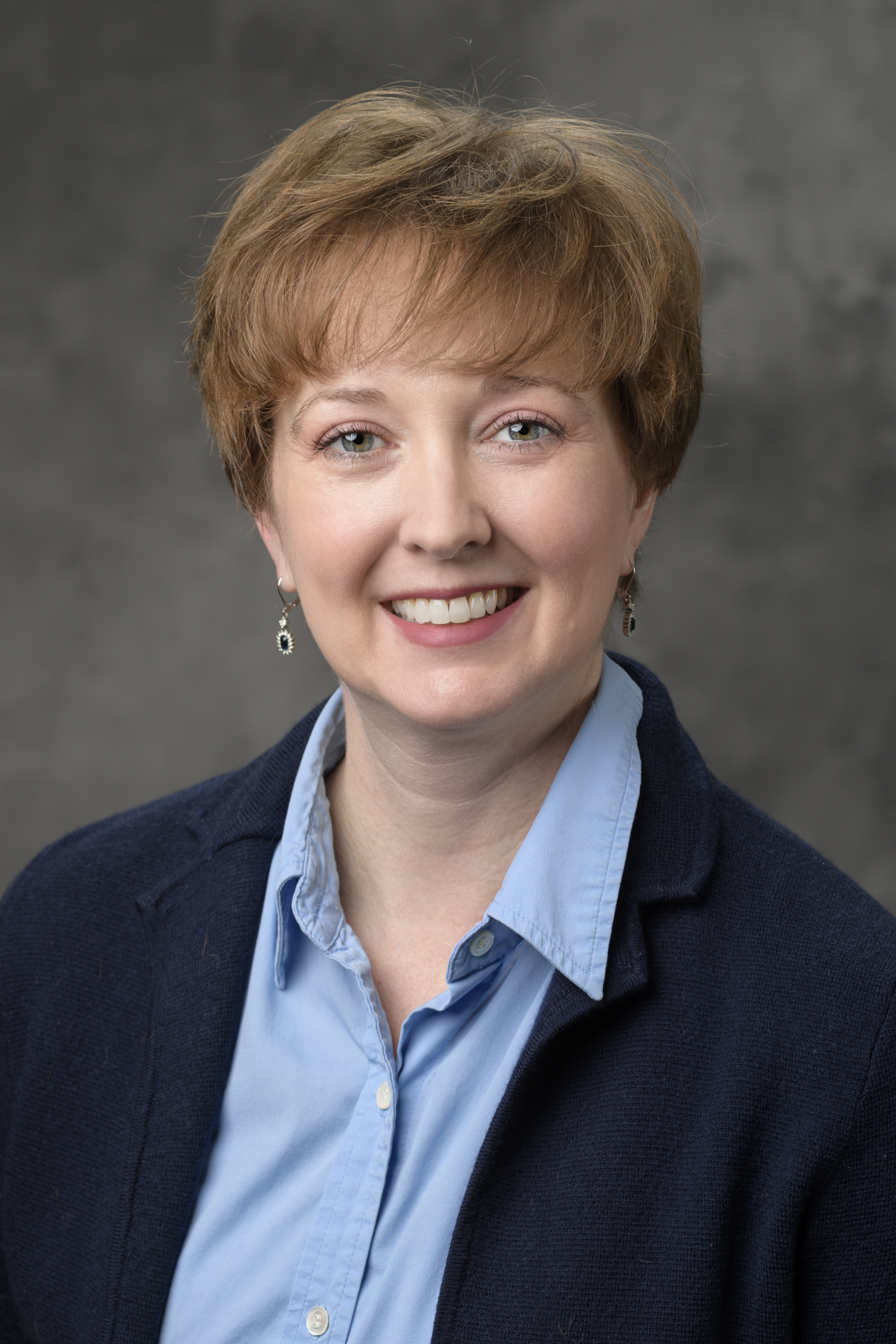
Training Videos Aim to Educate the Community about Substance Abuse and Solutions
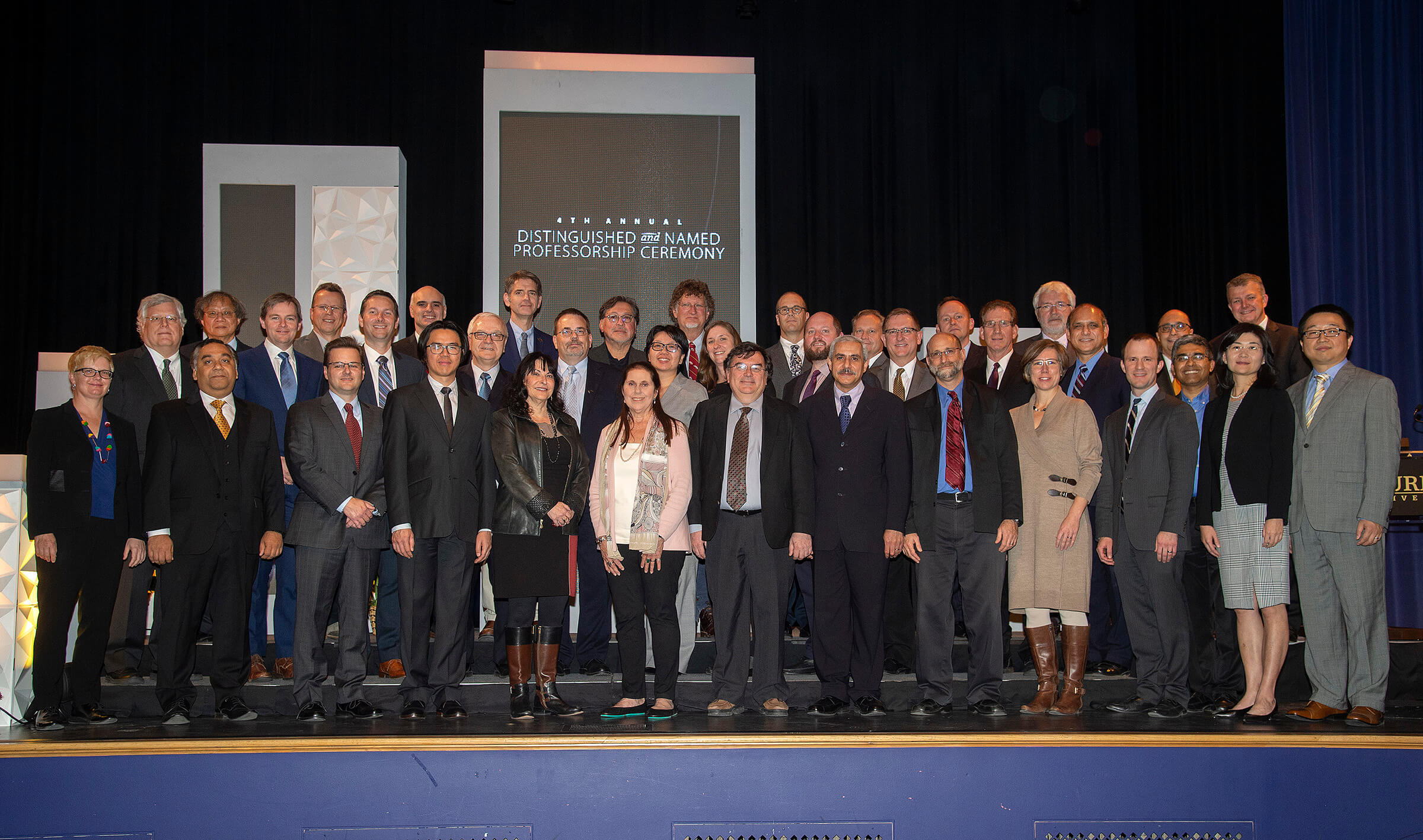
Distinguished and Named Professorship Ceremony honors faculty, administrators
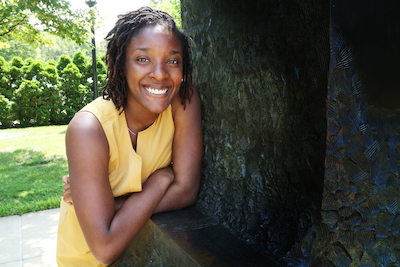
RCHE Student Johnson is First African American Female CS PhD

$150,000 in funding to advance, commercialize Purdue innovations
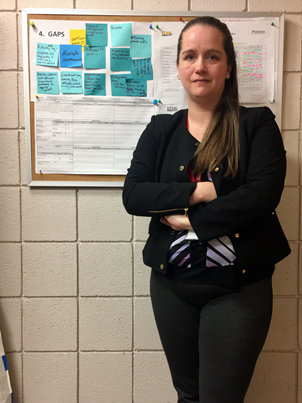
Personality disorder patients get timely care with group therapy
Purdue and Indian universities to collaborate on entrepreneurship and pharmaceutical sciences initiative
Older adults can be safely discharged from nursing homes if proper networks are in place
Building self-tests for the world's most common infectious diseases – with paper
RCHE Faculty Affiliates Kinzer-Ursem and Linnes Receive Rising Star Professorships
Jacqueline Linnes and Tamara Kinzer-Ursem were named Marta E. Gross Assistant Professors of Biomedical Engineering through the Purdue College of Engineering’s Rising Star program. The Rising Star Program recognizes assistant and associate professors for their exceptional accomplishments and leadership in research, teaching, and engagement.
The Marta E. Gross Assistant Professorships in Biomedical Engineering were established by alumnus Richard Barnes and his spouse, Marta Gross. Both are engineers, he from Purdue (BS, ChE, 1969) and she from MIT (SB, ChE, 1980) and both subsequently attended law school and practiced intellectual property law in the medical device and pharmaceutical realms. They are passionate about supporting female faculty members in engineering as applied to medicine.
These professorships are also part of the Regenstrief Center for Healthcare Engineering’s match program, as supported by the Regenstrief Foundation, that supports affiliated faculty members who focus on translation research for clinical impact.
Linnes conducts research in point-of-care diagnostics, pathogen detection and evaluation of therapeutic efficacy, miniaturization of molecular bioassays, rapid prototyping and low-cost health technologies, and microfluidics and paper-based diagnostics. Lean more: http://engineering.purdue.edu/LinnesLab
Kinzer-Ursem’s areas of interest include computational cell biology, systems biology, protein engineering, bionanotechnology and biosensors, protein microarray development and analysis. Learn more: https://engineering.purdue.edu/ursemlab/Home.html
RCHE Faculty Affliates Develop Method for Cholera Detection
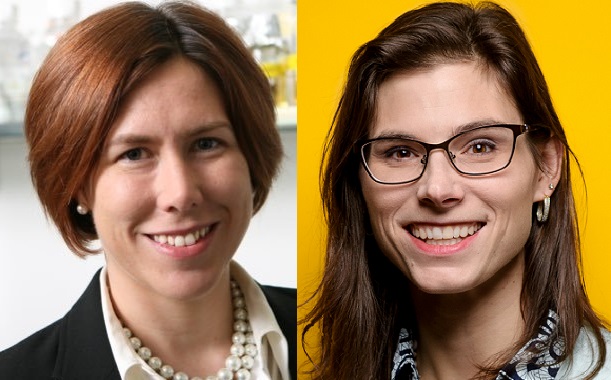
Regenstrief Center faculty affiliates Drs. Tamara Kinzer-Ursem and Jacqueline Linnes, along with other Purdue faculty and collaborators, have developed a new rapid cholera detection system using a technique that pairs loop-mediated isothermal amplification (LAMP) with particle diffusometry (PD). Cholera is an extremely important global public health problem. There are between 3 million and 5 million new cholera cases each year, leading to over 1000,000 deaths, mostly in children and the elderly. In addition, over 1.3 billion people are at risk for cholera in countries where the disease is reoccurs seasonally. Surveillance is a critical component for cholera control along with water sanitation, hygiene, vaccination, and treatment.
Their research appears in a recently published paper in the journal Scientific Reports. A key benefit of their PD-based approach is that it is 10-fold more sensitive than the current gold standard approach. Further, their new method takes only 30 minutes to detect cholera in pond water compared to the 8 hour process that is currently required. An additional benefit is that it does not require any enrichment or sample preparation steps, which means there is less environmental impact compared to the gold standard.
“The concentration of toxic Vibrio cholerae in contaminated water sources is exceedingly low. So we needed to develop a highly sensitive and yet robust method to detect its presence.” Says Dr. Kinzer-Ursem. “We envision using this PD-based approach to develop portable detection systems that can be deployed to assist in reducing the incidence of cholera in affected areas.”
The researchers are currently developing a smartphone-enabled point-of-care platform with a Purdue-based startup company, OmniVis. The platform uses the Global Positioning System for geotagging and time-stamping for real-time detection. In the case of detection, this supports a proactive response such as bringing clean water to the site or initiating a public health campaign.
Drs. Kinzer-Ursem and Linnes both hold the Marta E. Gross Assistant Professor of Biomedical Engineering at Purdue and are also core faculty in the Regenstrief Center for Healthcare Engineering.
Dr. Kinzer-Ursem joined Purdue in 2013. Her research combines theoretical-experimental approaches to enable quantitative descriptions of cellular processes. This research is applied to develop technologies for biomarker detection in disease diagnosis and progression, and to describe cellular functions in the brain. Dr. Linnes joined Purdue in 2015. Her work emphasizes the application of fundamental microfluidic principles and biological assays to develop point-of-care diagnostics for global health and wearable devices that enable health disparities research. Dr. Wereley joined Purdue in 1999. His research interests include micro- and nanofluidics, particle image velocimetry, opto-microfluidics and bio-MEMS.
Article citation: Clayton KN, Moehling TJ, Lee DH, Wereley ST, Linnes JC, Kinzer-Ursem TL. Particle diffusometry: an optical detection method for Vibrio cholera present in environmental water samples. Scientific Reports 9(1), p. 1739.
Drug abuse fighters get training
Pengyi Shi selected for INFORMS Pierskalla Award
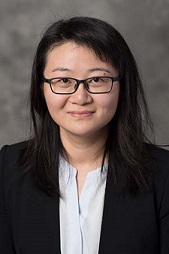
Pengyi Shi, Assistant Professor of Operations Management in the Krannert School of Management and affiliate faculty member of the Regenstrief Center for Healthcare Engineering, was awarded the INFORMS Pierskalla Best Paper Award. The award recognizes research excellence in the field of health care management science and includes an honorarium. The award winning paper is titled “Timing it Right: Balancing Inpatient Congestion versus Readmission Risk at Discharge” and was coauthored with Johnathan Helm, Assistant Professor of Operations and Decision Technologies in the IU Kelley School of Business, and Jivan Deglise-Hawkinson and Julian Pan from Lean Care Solutions Corporation.
When to discharge a patient plays an important role in hospital patient flow management and patient outcomes. In this work, the authors developed and implemented a practical decision support tool to aid hospitals in managing the delicate balance between a patient’s readmission risk at discharge and inpatient ward congestion. They formulated the discharge decision framework as a large-scale Markov Decision Process (MDP) that integrated a personalized readmission prediction model to dynamically prescribe both how many and which patients to discharge each day. They developed structural properties and an efficient algorithm to solve this MDP, and demonstrated the value of the recommended discharge policy over the hospital’s historical discharge through extensive counterfactual analyses. They also did a pilot implementation of this discharge tool at a partner hospital in Indiana.
INFORMS is the world’s largest professional association dedicated to and promoting vest practices and advances in operations research, management science, and analytics to improve operation processes, decision making, and outcomes.
Additional information about the INFORMS Pierskalla Best Paper Award may be found at: https://www.informs.org/Recognizing-Excellence/Community-Prizes/Health-Applications-Society/Pierskalla-Best-Paper-Award
The paper may be accessed at https://papers.ssrn.com/sol3/papers.cfm?abstract_id=3202975
Purdue Reaches Across the State to Help with Fayette County's Opioid Epidemic
RCHE, PHA, and Purdue Nursing Join Fight Against Opioid Epidemic
RCHE/PHA Receive $1.1M Grant to Assist Fayette County with Opioid Abuse Prevention
As part of the Empowered Communities for a Healthier Nation Initiative (ECI), the U.S. Office of Minority Health awarded the Regenstrief Center for Healthcare Engineering at Purdue University $1.1 million to provide three years of guidance and technical support to an Indiana community that has been disproportionately impacted by the opioid epidemic.
The center’s ECI project ? Empowering a Rural Community to Respond to Prescription Opioid Abuse ? aims to reduce prescription opioid abuse as well as increase patient access to addiction treatment and recovery services. The project’s intervention work already has begun in Fayette County, a rural, east-central Indiana community with one of the highest normalized annual opioid death rates in the state.
Along with Regenstrief Center, several areas of the university are involved in the ECI project. The center’s Purdue Healthcare Advisors (PHA) industry outreach program will manage the project, which also involves the Center on Poverty and Health Inequities, the Center for Medication Safety Advancement, and the Purdue Agile Strategy Lab. The lab’s Strategic Doing™ tool will be used to help the community collaborate in ways that produce innovative solutions tailored specifically to Fayette County.
“Community collaboration is one of the main aspects of the project, and it’s an aspect we insist upon when considering this kind of work because we know that enhanced community engagement in rural areas is more likely to spur more effective, locally relevant approaches, from crafting awareness campaigns to building strategy for the early identification of opioid abuse to the secure disposal of opioid medications,” Regenstrief Center director Paul Griffin said.
Several stakeholders have partnered with Purdue on the ECI project, including Fayette Regional Health System, the Fayette Health Department, and two local behavioral health groups: Meridian Health Services and Centerstone. The Fayette County Drug Coalition, which includes area law enforcement, local governance, retail pharmacies, schools and other social services, has joined the project, as well.
“Short on health care professionals and medically underserved, Fayette County and other, similar rural communities are at a disadvantage when it comes to the growing opioid epidemic. Here, capacity to treat those who have become addicted to prescription opioids can be outstripped by demand,” said Katrina Norris, Fayette Regional Health System’s vice president of Behavioral Health and Addiction Services. “We welcome initiatives designed to empower our patients and their families, clinicians, pharmacists, organizations and leaders to come together to make the improvements necessary to effectively combat prescription drug misuse and abuse.
Along with community collaboration, the project will address prescriber training; pharmacist instruction; building treatment capacity; and patient empowerment. “Our aim is to empower patients to adhere to treatment through thoughtful provider-patient collaboration and by evoking the patient’s own needs and goals. We do this by training the clinicians to employ a counseling method called Motivational Interviewing,” Griffin said.
Clinicians will use PHA’s microlearning tool kCards ? which delivers content to learners in small, specific bursts ? to develop their Motivational Interviewing skills. They will learn how to work with patients to help them develop habits to avoid or de-escalate opioid addiction as well as to adopt clinically appropriate, non-medication approaches to managing pain. In addition, they will become familiar with the National CLAS Standards that provide a blueprint for implementing culturally and linguistically appropriate services.
To enhance patient flow and increase capacity for time-sensitive addiction services in Fayette County, PHA will help hospitals, clinics and provider practices there leverage existing staff, exam rooms, supplies, and other resources through lean, process-improvement training.
To increase awareness of responsible prescribing practices, PHA will oversee prescriber training and pharmacist instruction with assistance from Altarum Institute, an accredited, non-profit Michigan-based organization. PHA also will train clinicians on prescription tracking as well as the screening and diagnosis of opioid misuse.
PHA will work with local retail pharmacies to increase naloxone availability by training pharmacists on the Indiana State Health Commissioner’s statewide standing order. This order allows doctors with prescriptive authority to issue a written order that naloxone be distributed by designated people, such as trained, harm-reduction program employees or friends and family members of the substance abuser, when predetermined conditions have been met. Family and friends also be trained on the use of naloxone.
The final goal of the project will be to disseminate best practices for the prevention and treatment of addiction epidemics to other rural communities throughout the Midwest.
About Regenstrief Center for Healthcare Engineering
The Regenstrief Center for Healthcare Engineering is part of Discovery Park at Purdue University and serves as a national nucleus for driving high-impact improvement in healthcare delivery by mobilizing the intellectual strengths of Purdue faculty and partners. Its applied arm Purdue Healthcare Advisors (PHA) is a not-for-profit outreach initiative created in 2005 to serve the training, project facilitation, and assessment needs of thousands of independent practices as well as hundreds of hospitals/healthcare systems striving to increase cost savings as they better the patient-care environment.
RCHE Research Scientist Adibuzzaman Receives “Above and Beyond” Award
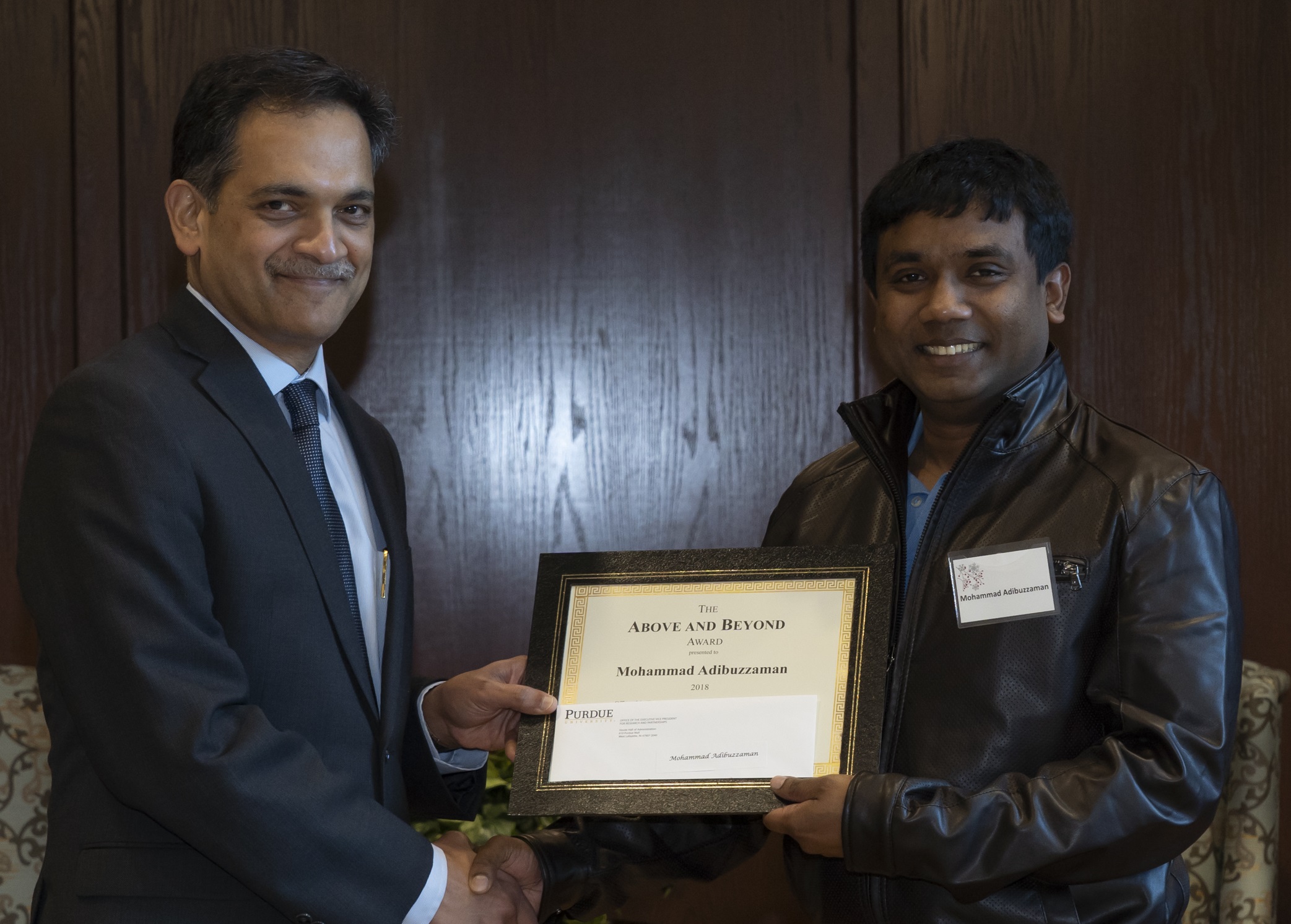
Dr. Mohammad Adibuzzaman, research scientist for the Regenstrief Center for Healthcare Engineering (RCHE), received Purdue’s Above and Beyond Award. This award recognizes those employees whose performance extends beyond excellence in their defined job responsibilities to extraordinary contributions that have made a positive impact on their department, Purdue, and/or the community.
Dr. Adibuzzaman was presented the award by Purdue’s EVPRP Suresh Garimella at a reception in Purdue’s Honors Hall. “Dr. Adibuzzaman has gone to extraordinary lengths to bring together Purdue researchers and clinical associates to work on important problems in data science that ultimately improve patient outcomes” said Paul Griffin, director of RCHE. “He has also helped to design and build a computational infrastructure for reproducible research that we all benefit from.”
Dr. Adibuzzaman joined RCHE in 2016 after receiving his PhD from Marquette University in 2015 in the area of Computational Sciences. He research interests are in artificial intelligence, causal inference, and high performance cloud computing for collaborative reproducible research.
Senior Administrative Assistant, RCHE Job Posting
Yih will investigate disparate cancer treatment experiences of Indy women
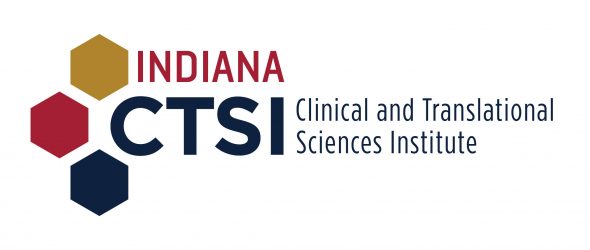
The Indiana Clinical and Translational Sciences Institute (CTSI) awarded funding to Regenstrief Center for Healthcare Engineering Associate Director and Industrial Engineering professor Yuehwern Yih for a research project focusing on the disparate mortality of black versus white breast cancer patients.
The CTSI awarded Yih with Community Health Partnerships (CHeP) Trailblazer Award funding for "Tracking the Process of Treatment Seeking in Black Breast Cancer Patients". The study is motivated by the disparate mortality rate of black versus white breast cancer patients in the greater Indianapolis area. Yih will examine disparities in access and patient experiences from screening to treatment, create a care map, and identify barriers to care that impede the progress of black patients through the cancer treatment system.
"We seek to understand the process through which black versus white patients obtain screenings and diagnoses, seek and enter care for breast cancer, and move through the system for breast cancer treatment," said Yih. "We hope to discover barriers that could be changed or overcome by design that could reduce the differences in mortality due to better access in treatment processes for cancer care."
Yih will collaborate with a community partner for this study, the Reaching to End Disparities (R.E.D.) Alliance, to use its established relationships with women in the faith-based community and their breast health advocates, and to collaborate with its other partners to recruit survivors to participate in experience mapping. The R.E.D. Alliance was organized in 2014 in response to research finding that in Indianapolis black women were 42% more likely to die from breast cancer than white women, despite comparable rates of screening and a lower likelihood of being diagnosed with breast cancer. In addition to this community partner, this interdisciplinary team also includes Dr. Poching DeLaurentis from the Regenstrief Center for Healthcare Engineering and Professor Cleveland Shields from the Department of Human Development and Family Studies, both at Purdue University.
The Indiana CTSI CHeP awards Trailblazer funding for collaborative research projects with both a university partner and a community partner, to improve Indiana residents' health through community-university partnerships. The collaboration must focus on topics that affect health equity, and both partners must currently work in an Indiana-based institution or organization.
RCHE receives $12M grant to address the opioid crisis and long term care costs for Medicaid
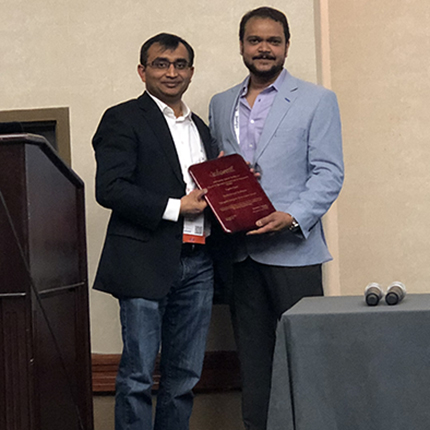
Mohammad Rahman selected for INFORM’s 2018 Award
Purdue Healthcare Advisors extends lean training to a nationwide market with the launch of its first online, lean process improvement course
WEST LAFAYETTE — Purdue Healthcare Advisors (PHA) will use PHA Direct, the e-learning platform it launched earlier this year, to expand access for the training and certification of Lean Daily Improvement Facilitators.
“Today’s technology allows us to share across the country what Purdue University experts have learned through a decade of coaching and training healthcare workers, many who have limited resources to make the changes necessary to support high-quality care and meet the requirements of state and federal compliance programs,” said PHA Director Randy Hountz, MSM. “In hundreds of cases, we’ve proved that Lean Daily Improvement (LDI) can reduce costs and increase revenue for clinics and hospitals as well as improve quality measures, clinical outcomes, and patient satisfaction.”
Now clinicians, administrators and practice managers, and others working in healthcare ? regardless of their location can study to become a certified LDI Facilitator. The course is part of Lean Immersion, a new, online training, coaching, and community-building program offered by PHA and the Regenstrief Center for Healthcare Engineering at Purdue. Lean Immersion serves to address barriers to performance improvement specific to healthcare, such as complex processes, subtle people-to-people interactions, and behavior-change challenges. Course registration is open and ongoing.
Trained LDI Facilitators will be able to make systematic, small-step changes while work is being done, and sustain the gains that have been made through other change efforts. They will be equipped with the knowledge and tools to identify a problem to solve; choose a key performance metric; collect and display data visually; run team huddles to get to root causes; assign corrective actions; and keep the process moving on a daily or weekly basis.
Providing organizations with a way for their lean teams to make small but meaningful daily adjustments in order to move or hold a metric is an essential part of a lean strategy, according to PHA Senior Advisor Jack Fenton, BBM, LSSGB, LGC. “LDI constitutes a level of lean training that resonates well with our clients because it’s simple, straightforward, and satisfying to those who are doing the work,” Fenton said. “LDI is not a rapid improvement event, a value stream analysis, six sigma or data science, but rather a team-based, continuous process improvement at the point of service…the place where healthcare organizations most need process-improvement support to build lean capacity.”
LDIF course participants may choose to complete the online training first to earn a digital badge, a recognized credential from Purdue. They have the option, but no obligation, to upgrade to complete the requirements for full certification. Coursework consists of online learning modules; quizzes; discussion; hands-on exercises; reflective practice; and contribution to Connect, PHA Direct’s online community that houses tools and real-world, process-improvement case studies. Certification includes the training component plus successful completion of applied work
While the LDI Facilitator course introduces lean methodologies that allow point-of-service teams to take ownership of and re-work the process, the Lean Behavior Change Facilitator course set to launch in 2019 focuses on developing the soft skills (i.e. interpersonal skills or "people skills") needed for the process to work. Learn more about the program at https://pha.purdue.edu/lean-immersion/.
About Purdue Healthcare Advisors
Purdue Healthcare Advisors (PHA) is a not-for-profit outreach initiative from Purdue University’s Regenstrief Center for Healthcare Engineering that serves the training, project facilitation, and assessment needs of the healthcare industry to increase cost savings and better the patient-care environment. PHA strives to improve patient care by enabling healthcare organizations to build capacity for change. PHA’s lean process improvement, quality reporting, and/or health IT services are focused on rural communities as well as practices, federally qualified health centers, critical access hospitals and rural hospitals, and other small and under-resourced providers.
Sources:
Randy Hountz, MSM, Director, Purdue Healthcare Advisors, (765) 494-0766; rhountz@purdue.edu
Jack Fenton, BBM, LSSGB, LGC, Senior Advisor-Lean Healthcare, Purdue Healthcare Advisors, (419) 957-4390; fentonj@purdue.edu
Related News Release:
4/26/2018 - Purdue launches online platform to prepare health care professionals in lean and people skill development
RCHE Visiting Scholar Milad Alucozai Awarded Global Honor by President Bill Clinton
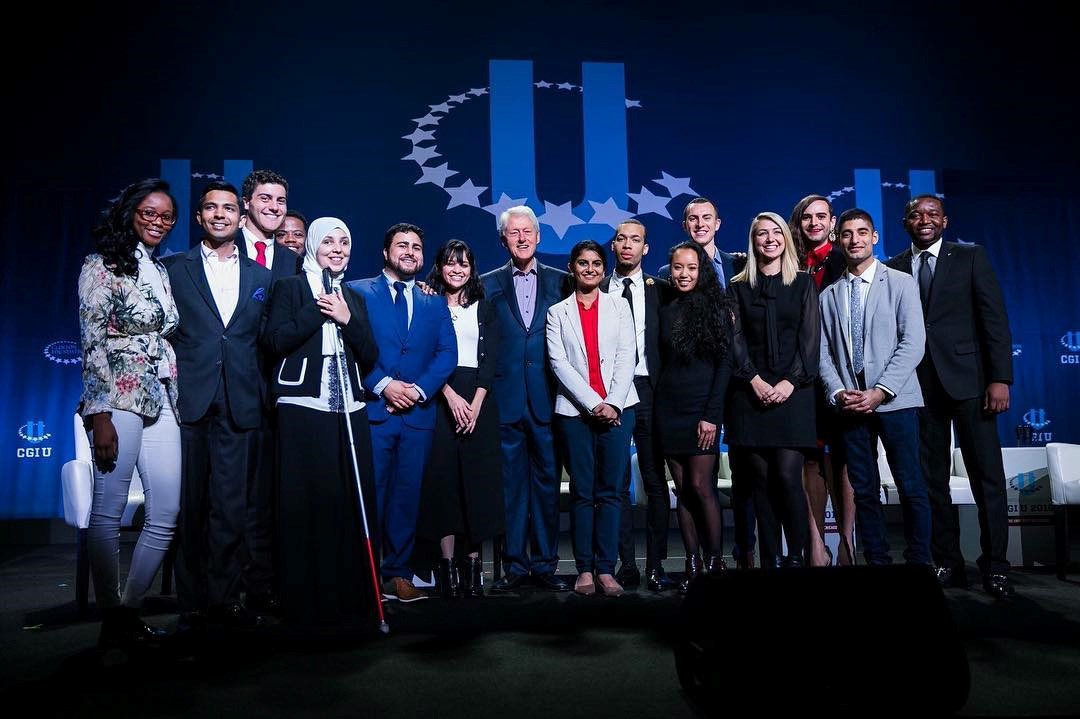
Chicago, IL – This past weekend, more than 1,000 students from across the country and around the world came together at the University of Chicago for the 11th annual CGI University (CGI U) meeting, making more than 700 Commitments to Action to address this generation’s most pressing challenges.
Milad Alucozai, a Purdue alum and the Visiting Scholar of the Regenstrief Center for Healthcare Engineering was recognized as a new member of the CGI U Honor Roll, a distinguished award that is given to a select, small cohort of global leaders who have made a significant impact in their careers and are continuing to dedicate their lives to tackling complex local and global challenges.
Alucozai is a Partner at Good AI Capital, a Silicon Valley based venture fund formed with fellow Purdue alum Darwin Ling, focusing on early stage investments in AI companies. With a mission-driven thesis of doing well by doing good, they invest in technical founders who are keen on applying AI towards solving some of the most acute problems faced across industries.
Over the years, Alucozai has been an invited participant at multiple CGI U events, a featured project recipient and campus representative. In 2015, he was selected from a worldwide pool of applicants to serve as a commitment mentor lead for healthcare related projects around the world. Most notably, one of his mentees was Dr. Gavin Armstrong the founder of Lucky Iron Fish recently featured on Dragons Den (Shark Tank).
In recognizing new members of the CGI U Honor Roll on stage, President Bill Clinton commented, “The alumni of CGI U have not only made remarkable commitments over the years, they have kept them. And in keeping them they are changing lives around the world in innovative ways.”
In addition to spending time with President Clinton, Milad was also invited to a private luncheon with Chelsea Clinton and spent time with other global leaders.
Alucozai commented, “The CGI U initiative is an event that is focused on young leaders from around the globe to come together and share ideas, get inspired, and take next steps towards making a positive impact. I am deeply humbled to accept this award, fully knowing that it was made possible by the countless mentors and colleagues who have worked tirelessly with me through the years. My education and relationships that I made at Purdue helped fuel the work I do and the person I am today. I will never take any of it for granted and will continue to pay it forward.”
IHI/NPSF Lucian Leape Institute recognizes RCHE’s REMEDI

The Institute for Healthcare Improvement (IHI), a leader in health and health care improvement worldwide, has chosen the Regenstrief National Center for Medical Device Informatics as a recipient of this year’s IHI/NPSF Lucian Leape Institute Medtronic Safety Culture & Technology Innovator Award. The award will be presented on September 13 at the 2018 IHI/NPSF Lucian Leape Institute Forum & Keynote Dinner in Newton, Massachusetts.
The award program was created with an unrestricted educational grant from Medtronic, inaugural funder of the IHI/NPSF Lucian Leape Institute, to recognize teams that improve patient safety through the successful implementation of technology and culture change. “The initiatives chosen to receive this year’s awards share a collaborative approach and improvement based in a commitment to learning,” said Tejal K. Gandhi, MD, MPH, CPPS, Chief Clinical and Safety Officer, IHI, and President of the IHI/NPSF Lucian Leape Institute. “They each demonstrate how safety cultures can improve the spirit and impact of collaboration. We are pleased to be able to recognize this work.”
The Regenstrief Center for Healthcare Engineering at Purdue University is being recognized for work to advance the safety of infusion pumps, which are commonly used in health care to administer medication or nutrients intravenously. “Smart” pumps use software that helps ensure the right dosage is being delivered at the correct rate and can also alert clinicians to adverse drug interactions. They are intended to help reduce the risk of adverse events, especially with high-risk medications, yet from 2005 to 2009, the Food and Drug Administration received 56,000 reports of adverse events associated with smart pumps, many related to device design or software flaws.
In response to this serious safety issue, a team of Regenstrief pharmacists and software engineers developed a web-based, vendor-neutral platform for sharing infusion pump data. Known as the REMEDI Collaborative, it is a free, online resource for clinicians, manufacturers, researchers, and medication safety organizations. Since 2010, membership has grown from 8 hospitals and health systems to 355 facilities in 28 US states and Costa Rica. “Participating organizations have embraced a culture of transparency in sharing data that, in turn, help other members learn and improve,” said Rich Zink, MBA, Team Lead. “The collaborative has become a vibrant community, giving members access to best practices and benchmarking tools and offering discussion forums and virtual conferences that connect members directly to others facing similar challenges.”
As a measure of improvement, the collaborative monitors compliance percentage and the volume of programming alerts. The higher the compliance percentage, the lower the chance of administering an overdose or underdose. Similarly, fewer alerts mean a lower risk of alert fatigue for clinicians. Data from the REMEDI collaborative show that between 2010 and 2017, user compliance with smart pump software has increased from 74 percent to 88 percent and alerts per device have been reduced from 113 to 49.
“This year’s awardees show that, whether working on a macro level or a micro level, the success of any initiative is highly dependent upon organizational culture,” said David J. Giarracco, Vice President, Global Market Development, Medtronic. “They also show how important it is to fully understand the root causes of problems in order to create lasting solutions. We congratulate these honorees for their impressive work.”
The IHI/NPSF Lucian Leape Institute (LLI) was established by the National Patient Safety Foundation (NPSF), which merged with IHI in May 2017. LLI’s members work on defining strategic paths and calls to action for the patient safety field, providing vision, context, and impetus for system-level change. Following the merger, LLI continues its work as a program within IHI.
Further information may be found at: http://www.ihi.org/about/news/Documents/IHIPressRelease_LLI_Awards_Sept2018.pdf
PRESS CONTACT: Joanna Clark, CXO Communication, joanna@cxocommunication.com
RCHE Associate Director Yih to co-Lead $70M USAID Consortium
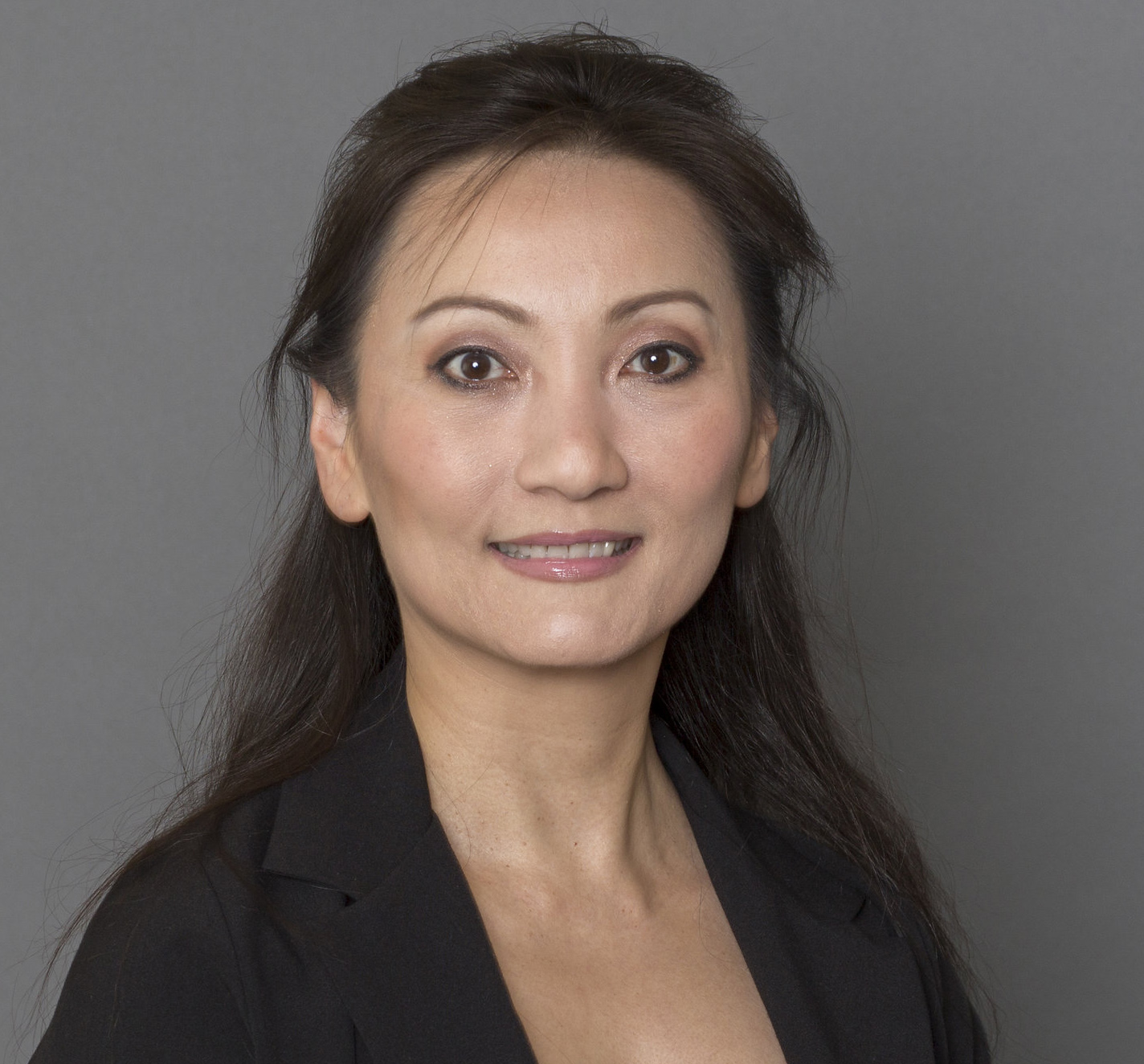
Yuehwern Yih, associate director of the Regenstrief Center for Healthcare Engineering, will serve as academic director of a new $70 million consortium to co-create research solutions for developing countries. The consortium is called the Partners for University Led Solutions Engine (PULSE) for USAID’s new Long-Term Assistance and Services for Research (LASER).
PULSE will help USAID identify research challenges in global health and food security. Supporting partners in the consortium are Indiana University, Notre Dame, Makerere University in Uganda, and Catholic Relief Services. The findings will be translated to a network of over 120 lower-middle income countries.
Additional details about the new center may be found at:
https://www.purdue.edu/newsroom/releases/2018/Q3/usaid-selects-purdue-led-center-to-research-worldwide-challenges.html
RCHE faculty Nan Kong receives two NSF awards

Nan Kong, associate professor of Biomedical Engineering and faculty affiliate for the Regenstrief Center for Healthcare Engineering received funding for two research grants.
The first award was for the proposal “Optimizing Trauma Care Network Design”, which will be funded over a three year period for $250K. This project will facilitate coordinated network design between state agencies and hospital networks, two key stakeholders in the trauma care system. It will enable trauma policy makers to quantitatively benchmark trauma care regionally and nationally in terms of triage errors and costs. The research team will collaborate with state officials, hospitals, and emergency care providers to validate the network optimization methods. The award will support graduate student research and provide experiential learning opportunities for undergraduate and graduate students in operations research related to healthcare policy and management. Research findings will be widely distributed to both the academic and practitioner communities.
The second award was for the proposal “Consistent Nursing Home Staff Planning under Heterogeneous Service Demand”, which will be funded for $243K over a three year period. To improve NH care quality, curb care costs and maintain resident-centeredness, the goal of this collaborative research award is to develop optimal nursing home (NH) staff planning analytical methods and tools to realize proactive, resident-centered and operational-detail-oriented staffing decisions. With the developed analytical tools and decision-support system, this project will improve workforce planning, recruitment and allocation decisions of NH management groups, allow NH staff to receive more balanced workload and establish consistent caregiving relationships with residents, and further allow NH residents to receive resident-centered care with their heterogeneous service demands satisfied as well as their health outcomes preserved/improved. This project will also help better inform and tailor the current staffing policies (e.g., minimum staffing standards) and promote consistent assignment in NHs to continuously transform the NH culture into delivering more resident-centered and home-like care.
Nan received his PhD in industrial engineering from the University of Pittsburgh in 2006. His research interest includes applying operations research to healthcare systems operations management and policy development. Recently, he has expanded his research to machine learning for health care, particularly hyperspectral image analysis and individual patient record analysis. He has published close to 60 peer-reviewed journal articles and conference proceedings papers. He has received grants from the National Science Foundation, National Cancer Institute, Agency for Health Research and Quality, and Air Force Office of Scientific Research. He is currently President-Elect of the Public Sector Operations Research Section in the Institute for Operations Research and the Management Sciences (INFORMS). In the past, he was council member and secretary of the Health Application Society in INFORMS. He has organized tasks/clusters for several INFORMS meetings, including INFORMS 2016, 2017, INFORMS International 2012, 2015, and INFORMS Healthcare 2013, 2017.
Zach Hass Joins RCHE as First Core Faculty Member
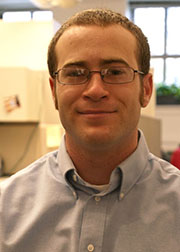
Zach Hass has joined the Regenstrief Center for Healthcare Engineering as core faculty member. Zach received his PhD in statistics from Purdue University and will serve as an assistant professor in the Schools of Nursing and Industrial Engineering. His research interests are in the areas of health services research and applied statistics.
Purdue University Dean of Engineering, Mung Chiang, made a commitment of five core faculty positions in the College in support of RCHE’s efforts. Zach is the first of this commitment of core faculty, and four additional faculty will be hired over the next three to four years.
Zach has several publications in the area of long term care that have focused on improved outcomes for long term care patients, including avoidable transfers, avoidable hospitalizations, and improved discharge.
Further information about Zach Hass may be found at: https://www.purdue.edu/hhs/nur/directory/faculty/hass_zach.html
RCHE Graduate Student Jaber Wins UAI Student Paper Competition

Amin Jaber, a PhD student in computer science working with the Regenstrief Center for Healthcare Engineering, won the Best Student Paper at the Conference on Uncertainty in Artificial Intelligence (UAI 2018), held in Monterey, California. The paper is titled “Causal Identification under Markov Equivalence”, and was co-authored by Jiji Zhang from the Philosophy Department at Lingnan University and Elias Bareinboim, assistant professor in Computer Science at Purdue University.
The Conference on Uncertainty in Artificial Intelligence is an international conference on research related to knowledge representation, learning, and reasoning in the presence of uncertainty. The award-wining student paper will appear in the Journal for Artificial Intelligence Research. In addition, Jaber and his co-authors were awarded a $1,000 prize.
The paper covers the problem of causal effect identification, which is concerned with determining whether a causal effect can be computed from a combination of observational data and substantive knowledge of the domain. Jaber and his co-authors combined the methods of causal graphs and Markov equivalence classes for causal identification.
The award was presented at the conference banquet on August 8th. Further information about UAI 2018 may be found at: http://auai.org/uai2018/schedule.php#schedule. The full paper may be downloaded from: https://www.dropbox.com/s/xt34vt0lkj3mto0/proceedings.pdf?dl=0.
ABSTRACT
Assessing the magnitude of cause-and-effect relations is one of the central challenges found throughout the empirical sciences. The problem of identification of causal effects is concerned with determining whether a causal effect can be computed from a combination of observational data and substantive knowledge about the domain under investigation, which is formally expressed in the form of a causal graph. In many practical settings, however, the knowledge available for the researcher is not strong enough so as to specify a unique causal graph. Another line of investigation attempts to use observational data to learn a qualitative description of the domain called a Markov equivalence class, which is the collection of causal graphs that share the same set of observed features. In this paper, we marry both approaches and study the problem of causal identification from an equivalence class, represented by a partial ancestral graph (PAG). We start by deriving a set of graphical properties of PAGs that are carried over to its induced subgraphs. We then develop an algorithm to compute the effect of an arbitrary set of variables on an arbitrary outcome set. We show that the algorithm is strictly more powerful than the current state of the art found in the literature.
RCHE research scientist Haque receives NIH funding to help children with autism spectrum disorder
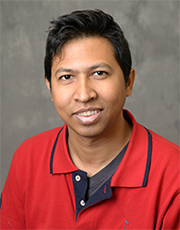
In Bangladesh, social-cultural-financial constraints and a scarcity of mental health care practitioners has deprived families raising children with Autism Spectrum Disorder (ASD) from regular monitoring, care, and support. However, the overwhelming adoption of mobile phones in Bangladesh in recent years has created an opportunity to improve the existing practice of care using affordable mobile applications.
RCHE research scientist and principal investigator Md. Munirul Haque along with Marquette University professor Shik Iqbal Ahamed, Purdue professor A.J. Schwichtenberg, and University of Toronto professor Syed Ishtiaque Ahmed received funding from the National Institutes of Health (NIH) to design, build, deploy, and study the impact of a mobile application (mCARE) as an evidence-based and data-driven remote behavioral monitoring platform for the care practitioners of children with ASD. The design of mCARE will follow Value Sensitive Design (VSD) approach to ensure a tight integration with the local economic, social, and cultural values in Bangladesh.
mCARE will be tested with caregivers of 300 children with ASD in Bangladesh for one year. The children will be selected from four reputed ASD care institutions in Bangladesh - two government and two privately owned, situated in two different districts. They are - the National Institute of Mental Health (NIMH), the Institute of Pediatric Neuro-disorder & Autism (IPNA), Autism Welfare Foundation (AWF), and “Nishpap”. The participants will cover a wide range of socio-economic and cultural diversity in Bangladesh.
Haque commented that “Although our focus in this study is children in Bangladesh, the proposed ESM application and corresponding practitioner-centered data platform can be adapted to improve practitioner-family communications and treatment management for children with ASD in the US as well. It is particularly suited for children living in rural locations.”
Venture Capitalist Milad Alucozai appointed Visiting Scholar by the Regenstrief Center for Healthcare Engineering
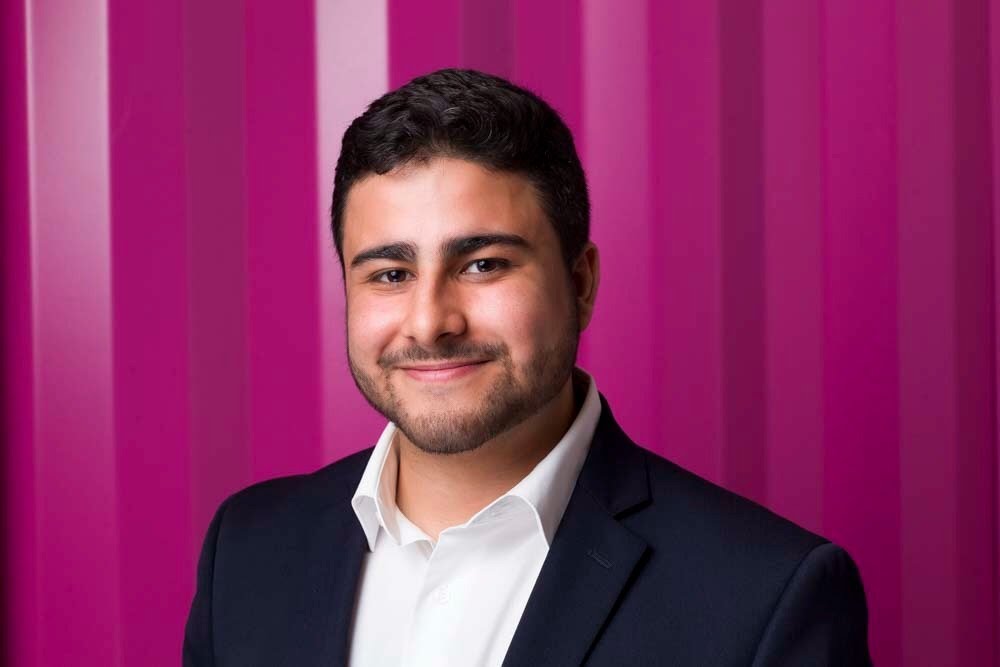
Milad Alucozai will couple his background in healthcare, business and investing to directly advance research, thought leadership, innovation and commercialization efforts for the Regenstrief Center for Healthcare Engineering (RCHE) and its affiliates. As a Purdue alum, Alucozai is no stranger to Purdue and translational research. As part of his on-campus appointment, Alucozai will engage closely with faculty, staff and students at RCHE and across the university.
Alucozai is a Partner at Good AI Capital, a San Francisco based venture fund formed with fellow Purdue alum Darwin Ling, focusing on early stage investments in AI companies. With a mission-driven thesis of doing well by doing good, they invest in technical founders who are keen on applying AI towards solving some of the most acute problems faced across industries. Prior, Alucozai was at Accenture’s Global Innovation Hub co-developing and delivering new global products and services with leading healthcare and life sciences clients using emerging technologies such as AI, Advanced Analytics, Blockchain, IoT and design thinking methodologies.
Alucozai added, “We at Good AI Capital believe that the next wave of AI innovations is emerging from areas beyond the Silicon Valley, we aim to establish relationships that magnify the strengths of local entrepreneurial ecosystems and have early access to invest and build the most transformative companies of tomorrow. RCHE along with its research scientists and affiliated faculty all exemplify a promising future for healthcare through their growing capabilities in data science and engineering. With these AI advances in research as well as the emergence of new talents, we are both privileged and excited to be part of RHCE to help enhance and grow these capabilities; sharing the mission of improving the quality, accessibility, equity, and affordability of healthcare delivery.”
RCHE director Paul Griffin commented, “Milad’s appointment highlights our commitment towards research and commercialization. We already have had a fruitful engagement and relationship with Milad and Darwin, two alums who share a deep desire to give back. Milad’s combination of technical knowledge, insights, relationships and strong commitment to our shared mission, make him a wonderful addition to our Center. His visiting scholar appointment will continue to enhance our Center’s capabilities for the long-term as well as the Purdue entrepreneurial ecosystem.”
Regenstrief Center for Healthcare Engineering receives five-year, $10 million renewal
Purdue launches online platform to prepare health care professionals in lean and people skill development
RCHE to host REMEDI 2018 Infusion Pump Collaborative Annual Conference
The Regenstrief Center for Healthcare Engineering (RCHE) at Purdue University is excited to host the REMEDI Pump Collaborative Spring 2018 Conference at the Big Ten Conference Center in Rosemont, IL, April 18 - 20, 2018. This is the annual gathering of the REMEDI pump collaborative; an energetic group of pharmacists, nurses, vendors, and others interested in advancing medication administration practice and improving patient safety. This event is for REMEDI members only. For more information on joining the REMEDI community, please contact REMEDI@purdue.edu.
PHA helps provider network improve diabetes care monitoring
IU cancer patients to test Purdue smartphone app for anemia detection
Yuehwern Yih receives ‘Grand Challenges Explorations’ grant
REMEDI wins Institute for Safe Medication Practices (ISMP) Cheers Award
RCHE Faculty Member Kathleen Abrahamson wins Hulman Health Achievement Award
REMEDI adds two new benchmarking databases
The Regenstrief Center for Healthcare Engineering, in partnership with the AAMI Foundation’s National Coalition for Alarm Management Safety, is providing two new benchmarking databases; one for physiological monitor alarm settings and defaults and the other for ventilator alarm defaults. The databases are available at no charge to help clinicians improve patient safety and quality. To access the databases, a hospital only needs to agree to the terms of the membership agreement and share their data. Visit remedicentral.org for more information on joining.
Physiological Monitor Defaults
Where do we start when monitoring patients? The Physiological Monitor Defaults application helps clinicians answer this question by providing benchmarking tools to see where other hospitals initially set their alarm thresholds for heart rate (HR), peripheral capillary oxygen saturation (SpO2), systolic and diastolic blood pressures (BP), end-tidal carbon dioxide (EtCO2), and other alarm conditions. Additionally, clinicians can use the application to compare detection priorities for numerous alarm options for apnea, asystole, brady, vfib/vtach, PVC, trigeminy and many more.
Ventilator Settings
Ventilator Settings application allows respiratory technicians and other clinicians the ability to examine the variation in the default settings hospitals use for key ventilator alarms including positive end-expiratory pressure (PEEP), peak inspiratory pressure (PIP), tidal volume (VT), minute volume (MV), respiratory rate (RR), apnea and disconnect priority. Users can benchmark other hospitals by filtering on several hospital characteristics (e.g., urban/rural, size, teaching/non-teaching, primary population, care level, etc.)
Dr. Judith Monroe, CDC Foundation leader, to speak at Purdue Oct. 4
Purdue researchers receive grant to improve mobile testing for anemia
RCHE co-sponsors Women's Health Symposium
Discovery Park Scientist Helps To Close Data Analysis Loop
PHA and Qsource accept CMS challenge to guide 90% of Indiana clinicians through QPP reporting
PHA, GLPTN work with clients to improve MIPS scores
RCHE graduate student Kang-Yu Hsu wins 1st prize at the 2017 IEGSO Research Symposium poster competition
RCHE graduate students place first and third places in the Health and Disease: Science, Technology, Culture and Policy Research poster session
PHA, State of Indiana partner again to extend/expand EHR Meaningful Use support with $3.6M grant
REMEDI Team Wins 2017 AAMI Clinical Solution Award
The Regenstrief National Center for Medical Device Informatics (REMEDI) team led by Richard Zink was chosen for the 2017 Association for the Advancement of Medical Instrumentation (AAMI) Clinical Solution Award. This award is based on the application of innovative clinical engineering practices or principles to solve one or more significant clinical patient care problems or challenges, and will be presented at the AAMI 2017 Conference & Expo in Austin, Texas on June 10, 2017.
The team was recognized for having made significant contributions in assisting hospitals to improve patient safety and quality. Marilyn Neder Flack, Executive Director of the AAMI Foundation, said that “REMEDI has developed an evidence-based community of practice using medical device informatics from infusion pumps to improve infusion therapy safety. The REMEDI infusion pump program is the only patient safety improvement program in the country that reaches across manufacturers’ infusion smart pump technologies to create a network of individuals from 279 hospitals across 23 states, all of whom are willing to share information about data in their smart pump drug libraries and lessons learned as they improve clinician compliance with the use of those drug libraries.”
Richard Zink is Managing Director of Operations for the Regenstrief Center for Healthcare Engineering (RCHE), and is responsible for developing evidence-based decision support tools, supporting communities of healthcare providers and researchers, and directing the RCHE Purdue Patient Safety Organization. “We are honored and privileged to win this prestigious award”, said Zink. “Having the AAMI Foundation, whose primary mission is to serve the public welfare and improve patient safety, recognize the team’s efforts is particularly gratifying. This award would not be possible without the hard work of those currently affiliated with the project, the previous efforts of those that laid the foundation, and the heart and soul of the REMEDI collaborative; the pharmacists, nurses, vendors and others, who willingly share their knowledge to make infusion therapy safer for patients everywhere.” Other members of the team include Daniel D. Degnan III (Center for Medication Safety Advancement), Poching DeLaurentis (RCHE), James B. Graves (ITaP), Damion A. Junk (ITaP), Alissa J. Nedossekina (ITaP), Michael G. Zentner (ITaP), and Kang-Yu Hsu (RCHE).
AAMI is made up of roughly 7,000 members with the mission to “develop, manage, and use safe and effective healthcare technology”. Further details about the AAMI Clinical Solutions Award may be found at: http://www.aami.org/professionaldevelopment/content.aspx?ItemNumber=1071
Purdue researcher Bradley Duerstock helps visually impaired identify images through assistive technology
Paul Griffin named St. Vincent Health Chair of Healthcare Engineering
PHA receives funding to assist 6,000 clinicians
Purdue Regenstrief Center Appoints Director
Purdue Regenstrief Center for Healthcare Engineering announces new director
One Brick Higher Award presented to Discovery Park centers' leader
AAMI Foundation Publishes Infusion Therapy Safety ‘Quick Guide’
Director Search Announcement
Director, Regenstrief Center for Healthcare Engineering
Purdue University invites applications, inquiries and nominations for the position of Director of the Regenstrief Center for Healthcare Engineering (RCHE). The Center is a partnership between the Regenstrief Foundation and Purdue University; it is built on a mission of research that improves healthcare by applying the principles of engineering, science and management to issues of national and global importance.
One of the founding centers in Purdue's dynamic Discovery Park, the Regenstrief Center for Healthcare Engineering has grown to more than $95 million in cumulative extramural research funding. Its responsibilities encompass large-scale interdisciplinary research projects, tool development for communities of practice, and the implementation of innovations and improvements in healthcare delivery. The Center is designated a Patient Safety Organization (PSO) by the United States Department of Health and Human Services. This designation places it in a limited group authorized to receive self-reported accounts of adverse healthcare events in patients throughout the nation. Commitments by the leadership of Purdue University and the Regenstrief Foundation will provide the resources to allow the Director to position the Center to deliver novel contributions of significant impact across the nation’s healthcare system.
The senior leadership at Purdue University is fully committed to the success, growth and development of RCHE as a leader in healthcare systems engineering. The Director of the Regenstrief Center for Healthcare Engineering reports to the Chief Scientist and Executive Director of Discovery Park. The RCHE Director will be responsible for supporting the overall mission of the Center and the Regenstrief Foundation by establishing and implementing a strategic plan to position the Center for maximum impact; engaging faculty and staff to achieve critical milestones focused on improved healthcare delivery; developing quality healthcare partnerships; generating significant extramural funding; gaining increased national and international recognition; and optimizing relationships with key stakeholders including the Regenstrief Foundation.
The ideal candidate will possess academic credentials for appointment to a senior faculty position. Candidates are expected to have an established career in engineering, science, healthcare and/or management with a record of excellence in research that has been effective in addressing complex problems in healthcare. Experience is desired that demonstrates a successful record of scholarship in well-funded research programs, academic excellence, outstanding achievement in developing and leading large interdisciplinary research programs, effective management of diverse staff, and proven experience working with multidisciplinary research groups via effective team-building. Applications are desired from candidates who have excelled in rapidly changing environments, and who have a proven record of responding effectively to fast-developing opportunities. More information about RCHE can be found at: http://www.purdue.edu/discoverypark/rche/.
Inquiries, nominations and expressions of interest, including a CV and cover letter describing professional background and qualifications, can be sent in confidence to consultants Brian Bloomfield and Joyce DeLeo, Ph.D., via email to RCHE-Director@wittkieffer.com. The position will remain open until filled, but candidate materials should be received as soon as possible given the importance of this 1 leadership opportunity. The recruitment will be conducted in confidence until finalists are invited for campus visits at which time professional references will be contacted.
Purdue University is an EEO/AA employer fully committed to achieving a diverse workforce. All individuals including minorities, women, individuals with disabilities and veterans are encouraged to apply. A background check is required for employment in this position.
Yuehwern Yih is appointed the associate director of RCHE
Kaplan joins the Regenstrief Center for Healthcare Engineering as Regenstrief Distinguished Fellow
Robert M. Kaplan, joins the Regenstrief Center for Healthcare Engineering as Regenstrief Distinguished Fellow.
Robert M. Kaplan served as the Chief Science Officer at the US Agency for Health Care Research and Quality (AHRQ) and as the National Institutes of Health Associate Director, where he led the behavioral and social sciences programs.
Kaplan was formerly a distinguished professor of health services and medicine at UCLA, where he led the UCLA/RAND AHRQ health services training program and the UCLA/RAND CDC Prevention Research Center. He was Chair of the Department of Health Services from 2004 to 2009. From 1997 to 2004 Kaplan was professor and chair of the Department of Family and Preventive Medicine, at the University of California, San Diego. He is a past president of several organizations, including the American Psychological Association Division of Health Psychology, Section J of the American Association for the Advancement of Science (Pacific), the International Society for Quality of Life Research, the Society for Behavioral Medicine, and the Academy of Behavioral Medicine Research. Kaplan is a former Editor-in-Chief of Health Psychology and of the Annals of Behavioral Medicine. His 18 books and over 500 articles or chapters have been cited more than 28,000 times. Kaplan is a member of the National Academy of Medicine (formerly the Institute of Medicine).
Fed. agency designates Regenstrief Center for Healthcare Engineering as Patient Safety Organization
National search to be launched for director of Regenstrief Center for Healthcare Engineering
Telementoring with TAURUS
Providing research experience and mentoring to statistics undergrads
Cluster Hire in Public Health
Eight Positions in Prevention of Chronic Disease/Public Health
Purdue University invites applications for eight tenure-track faculty positions in a research cluster centered on Prevention of Chronic Disease/Public Health at the Assistant Professor level or higher. Areas of interest include, but are not limited to, public health, epidemiology, health informatics, and health technology. Successful candidates will work collaboratively in an inter-disciplinary cohort to advance the new initiative in Public Health research and education at Purdue University. Qualified applicants in one or more of the areas listed below may apply to up to three of the following positions.
Campus programs of relevance to this cluster hire include the Indiana Clinical and Translational Science Institutehttp://www.indianactsi.org, Regenstrief Center for Healthcare Engineeringhttp://www.purdue.edu/discoverypark/rche/, Purdue University Center for Cancer Researchhttp://www.cancerresearch.purdue.edu/, and Discovery Park http://www.purdue.edu/discoverypark/
Department of Nutrition Sciences
One position of any rank is available in the Department of Nutrition Science for a candidate whose research focuses on the role of diet in prevention of chronic disease.
Department of Health and Kinesiology
One Assistant Professor position is available in the Department of Health and Kinesiology for a candidate whose research focuses on one or more of the core public health areas: Epidemiology, Biostatistics, Admin. & Policy, Behavioral Theory, Environmental Health.
Six other positions will be selected from among the following Departments or joint appointment between Departments.
One Associate or Full Professor position is available for a faculty member whose established program of research focuses on primary prevention of chronic disease, health promotion, and use of technology in promoting health communication and/or health behaviors.
One Assistant or Associate Professor position is available. Areas of interest include, but are not limited to, environmental epidemiology with research focused on neurodegenerative diseases, carcinogenesis, or other chronic diseases resulting from environmental and occupational exposure to metals, pesticides, particulates, or physical agents.
Department of Human Development and Family Studies
One Assistant or Associate Professor position is available. Areas of interest include, but are not limited to, childhood obesity, health disparities, methodological and statistical approaches to public health, or family functioning and health.
Department of Consumer Sciences and Retailing
One Assistant or Associate position is available where the focus is on consumer behavior and consumer economics. Research areas that will be considered for this position include demographics, application of analytics and visualization to very large health-related data sets to model health behaviors for disease prevention, forecasting, and other consumer behavior and economics related to disease and public health.
Department of Computer Information Technology
One Assistant Professor position is available. Areas of interest include, but are not limited to, electronic health record, data and system security, computerized clinical decision support systems, electronic exchange of health information, andconsumer health informatics computer applications.
Department of Computer Graphics Technology
One Assistant Professor position is available. Areas of interest include, but are not limited to, user interface design for healthcare and/or Healthcare Informatics applications, large scale health behavior patterns data mining and scientific visualizations, user-friendly mobile computing applications for patient homecare monitoring, innovative user interfaces for making Healthcare Informatics easily accessible to non-technical populations, information sharing among healthcare providers through informal communities using virtual community and social networking technology, alternate approaches for professional communications in Healthcare Informatics, simulation and gaming.
For information specific to each position go to:http://www.purdue.edu/discoverypark/ClusterHireinPublicHealth
Successful candidates will be expected to develop an internationally-recognized research program, interact with diverse faculty, staff and students across campus, contribute to the further development of prevention of chronic disease/public health as an area of excellence on the Purdue University campus, demonstrate excellence in teaching, and function as an active member of the departmental and university faculty. Purdue University is a large and vibrant life and health science community. Our faculty spans disciplines that include basic and social sciences, agriculture, veterinary medicine, pharmacy, and engineering. Faculty members also participate in interdisciplinary programs in health and human sciences.
Applicants should have a PhD or MD, post-doctoral experience depending on field of study, a strong publication record, the potential to develop a vigorous, extramurally-funded research program, and a commitment to research and teaching excellence. Applications should include in a single pdf file a cover letter, curriculum vitae, two-page summary of research interests, and a one-page teaching statement. Applications and three letters of recommendation should be submitted electronically to haan@purdue.edu. Screening of applications will begin on August 1, 2012 and will continue until the positions are filled. A background check will be required for employment in these positions.
Purdue University is an Equal Opportunity/Equal Access/Affirmative Action Employer fully committed to achieving a diverse workforce.
Sharing individual health information could improve care and reduce costs for all
RCHE, OurHealth partner on research project to enhance care delivery
RCHE faculty publications in 2012
B chul Kwon, Z Dong, KS Yehle, KS Plake, LM Yahiro, S Kranz, JS Yi.Food for the Heart: Lessons Learned while Designing a Visual Decision Support System for Patients with Coronary Heart Disease. Advances in Human Aspects of Healthcare. Chapter 8. July 2012.
B Kwon, I Hur, JS Yi. A review of web-based dietary interventions: From the human–computer interaction practitioners' perspective.Human Factors and Ergonomics in Manufacturing & Service Industries. June 2012.
DePalma G, Xu H, Covinsky KE, Craig BA, Stallard E, Thomas III J, Sands LP. Hospital Readmission among Older Adults Who Return Home With Unmet Need for ADL Disability. The Gerontologist, online, doi:10.1093/geront/gns103
Dutta, M. (2012). Communication social change: Structure, culture, agency. Taylor & Francis.
Edwardsen, EA; Reis, S; Morse, DS; Gurnsey, MG; Taupin, A; Shields, CG; Griggs, J; McDaniel, SH. "Physician dialogues with advanced cancer patients: mostly patient-friendly but often physician-directed". International Journal of Person-Centered Medicine. 2012.
Hunte HER, Barry AE. The association between perceived discrimination and DSM-IV based alcohol and illicit drug use disorders in the National Survey of American Lives. American Journal of Public Health. 12/2012.
Hunte HER,Mentz G, House JS, Schultz AJ, Williams DR, Morenoff J, Elliot MR, White-Perkins DM. Correlates of Racial/Ethnic Disparities in the Prevalence, Awareness, Treatment and Control of High Blood Pressure in Two Large Urban Cities. Ethnicity and Disease. 12/2012.
Jacob, Mithun George, Juan Pablo Wachs, Rebecca A. Parker. Hand-gesture-based sterile interface for the operating room using contextual cues for the navigation of radiological images. Journal of the American Medical Informatics Association. December 2012.
KS Yehle, AMH Chen, KS Plake, JS Yi, AR Mobley.A Qualitative Analysis of Coronary Heart Disease Patient Views of Dietary Adherence and Web-Based and Mobile-Based Nutrition Tools. Journal of Cardiopulmonary Rehabilitation and Prevention. 32 (4), 203-209. July 2012.
Nuti, L., Lawley, M., Turkcan, A., Tian, Z., Zhang, L., Chang, K., Willis, D. Sands, L. “Diabetic Patients that No-show to their Primary Care Appointments: Subsequent Emergency Department Visits and Hospitalizations” Biomed Central (BMC) Health Services Research, doi:10.1186/1472-6963-12-304,12:304, 2012.
Sands LP, Xu H, Thomas III J, Paul S, Craig BA, Rosenman M, Doebbeling CC, Weiner M. Volume of Home and Community Based Services and Time to Nursing-home Placement, Medicare and Medicaid Research Review, 2(3), E1–E21, 2012.
Shippee, Tetyana Pylypiv, Markus H. Schafer, and Kenneth F. Ferraro. 2012. “Beyond the Barriers: Racial Discrimination and Use of Complementary and Alternative Medicine among Black Americans.” Social Science and Medicine74: 1155-1162.
Turkcan, A., Zeng, B., Lawley, M., “Chemotherapy Operations Planning and Scheduling” IIE Transactions on Healthcare Systems Engineering, 2(1), 31-49, 2012.
Xu H, Covinsky KE, Stallard E, Thomas III J, Sands LP. Insufficient Help for ADL Disabilities and Risk for all-cause Hospitalization, in press, Journal of the American Geriatrics Society,60;927-933, 2012.
RCHE's Spring Research Speaker Series announced
U.S. medication safety expert will give keynote talk at Regenstrief Center's fall conference
A national leader in the area of medication safety will be the speaker next week at the Regenstrief Center for Healthcare Engineering's fall conference focused on the use of infusion pumps in health-care settings.
Allen Vaida, executive vice president for the Institute for Safe Medication Practices and an expert in hospital and pharmacy systems and management, will speak at 8:30 a.m. Oct. 24 in conjunction with the conference, titled The Wizard Behind the Curtain: Maximizing the Safe Use of Smart Pumps.
The conference, which is free and open to the public, will run from 8-10 a.m. in the Purdue Memorial Union's East/West Faculty Lounges. Vaida's presentation and conference coincide with a fall workshop led by Regenstrief, bringing together members of the Infusion Pump Informatics Community at Purdue to discuss key issues in medication administration safety.
To register, go online tohttp://www.purdue.edu/discoverypark/rche/events/conferences/2012/registration.php
"Infusion pumps, also known as smart pumps, are becoming more common in hospitals and provide important safeguards in assuring patient safety," said Regenstrief director Steve Witz. "But they also are one of the many alert-generating equipment pieces in a hospital room with which hospital staff must interact."
Regenstrief is partnering with several major Midwestern hospitals through Purdue's Infusion Pump Informatics to develop safety standards for smart pumps, which have become commonplace in the past decade for administering drugs to patients. Through RCHE's Web-based tool, users can easily share analysis, data reporting and best practices for smart pumps.
Today, an estimated 2 million smart pumps are in hospitals and clinics and thousands more are used by patients in their homes, offering a variety of designs to intravenously deliver nutrition, fluids and drugs like pain medications, insulin and cancer treatments.
The pumps come with a programmable computer to control the rate and volume of medication flow, which can vary depending on the patient's illness, weight, age and other factors. A doctor, nurse or other health-care worker enters information on the infusion pump's keypad.
Despite their advantages, the FDA reports that infusion pumps were linked to more than 56,000 adverse event reports from 2005-2009, including more than 700 deaths.
As executive director of the Huntingdon Valley, Pa.-based Institute for Safe Medication Practices (ISMP), Vaida is part of the nation's only nonprofit organization devoted entirely to medication error prevention and safe medication use. The organization represents more than 35 years of experience in helping health-care practitioners keep patients safe and continues to lead efforts to improve the medication-use process.
Its medication error prevention efforts began in 1975 with a groundbreaking and continuing column in "Hospital Pharmacy" that increases understanding and educates health-care professionals and others about medication error prevention. In 2009 ISMP celebrated the 15th anniversary of its official incorporation as a nonprofit organization.
Before joining ISMP, Vaida served as vice president of clinical operations (chief operating officer) at Mercy Suburban Hospital in Norristown, Pa., as well as director of pharmacy and assistant vice president and director of pharmacy at Suburban General Hospital in Norristown.
Vaida also is a clinical assistant professor at the University of the Sciences in Philadelphia, assistant adjunct professor at Temple University School of Pharmacy, adjunct associate for the Centers for Heath Policy and Primary Care and Outcomes Research at Stanford University and Stanford University School of Medicine, and adjunct faculty for the Executive Patient Safety Fellowship offered through Virginia Commonwealth University.
He served on the U.S. Pharmacopeia's Safe Medication Use Expert Committee from 2000-05. Vaida received a bachelor's degree in biology from the University of Scranton, a bachelor's in pharmacy from the Philadelphia College of Pharmacy and Science and a doctorate of pharmacy degree from the University of Minnesota.
Earlier this year, Purdue's Regenstrief Center received $10 million in additional research funding to expand its partnership with the Indianapolis-based Regenstrief Foundation though 2018.
Located in Discovery Park, Purdue's hub for interdisciplinary research, the Regenstrief Center conducts research to catalyze the transformation of healthcare delivery systems by applying the principles of engineering, management, and science to healthcare system challenges.
The Indianapolis-based Regenstrief Foundation provides core research funding and support for the Regenstrief Center, enabling it to have impact on health system challenges through collaboration with health-care partners. The foundation's work supports the legacy of Sam Regenstrief’s vision: The continued improvement of the health-care delivery system.
Writer: Phillip Fiorini, 765-496-3133, pfiorini@purdue.edu
Source: Steve Witz, 765-496-8303, switz@purdue.edu
Related websites:
Maximizing the Safe Use of Smart Pumps
Discovery Park center receives $10 million in research funding from Regenstrief Foundation
RCHE renewal to support continued healthcare delivery research
The Regenstrief Foundation is expanding its major partnership with Purdue's Regenstrief Center for Healthcare Engineering, providing $10 million in additional research funding for the Discovery Park center through 2018, officials announced Tuesday (Sept. 11).
Jack Shaw, president of the Indianapolis-based Regenstrief Foundation, said the partnership, initiated in 2005, has been an investment not just in Purdue, but also in addressing the critical health-care issues facing every American."This funding of $2 million a year for the next five years will allow theRegenstrief Center to focus on front-line impact with its research," said Purdue acting President Timothy Sands. "Researchers will now have additional support to pursue projects with the greatest opportunities to enhance efficiencies in our nation's $2 trillion health-care system."
"We're excited about what this additional funding will mean to the Purdue center's research efforts for addressing a U.S. health-care industry that remains in serious need of reform," Shaw said.
The Regenstrief Center for Healthcare Engineering (RCHE) was borne out of the 2004 report, "Building a Better Delivery System: A New Engineering/Health Care Partnership," by the National Academy of Engineering and the Institute of Medicine.
Co-written by Purdue industrial engineering professor and RCHE Advisory Committee member W. Dale Compton, the report outlined ways that systems engineering could help deliver safe, effective, timely, equitable, efficient and patient-centered health care.
Regenstrief Center director Steve Witz, Purdue's St. Vincent Health Chair of Healthcare Engineering, said RCHE has leveraged nearly $16 million worth of funding from the Regenstrief Foundation into more than $53 million in health-care related research funding from federal and state agencies, industry players, and organizations.
Witz said the new funding will help the center expand its focus on the center's two research focus areas: care coordination and population health.To date, Regenstrief's research has launched the Infusion Pump Informatics Network to assist several Midwest hospitals in sharing best practices on the use of what are known as "smart pumps."
RCHE's research and dissemination partners include 13 provider and professional organizations. Mayo Clinic became a partner in 2010, joining others such as the American College of Physicians, Ascension Health and Community Health Network. Regenstrief also was a founding member of the Healthcare Systems Engineering Association, a national professional organization promoting excellence in research and education in health-care systems engineering.
"We envision a health-care system that guides patients and families through their health-care experience, while respecting patient choice, offering physical and psychological supports, and encouraging strong relationships between patients and the health-care professionals accountable for their care," Witz said. "We envision communities that foster health and wellness as well as national, state and local systems of care fully invested in the prevention of disease, injury and disability - reliable, effective and proactive in helping all people reduce the risk and burden of disease."
RCHE also is impacting the next generation of health-care engineers and researchers by offering internships, fellowships and exposing undergraduate and graduate students to research opportunities in a variety of disciplines.
In addition, the center is collaborating with the Regenstrief Institute Inc., which is located at the Indiana University School of Medicine in Indianapolis. An international leader in health-care informatics, the institute was launched in 1969 and today has one of the world's first and largest electronic medical record systems with more than 300 million online clinical results.
The Regenstrief Foundation helped create Purdue's Regenstrief Center for Healthcare Engineering with a $3 million gift in 2005 and invested another $11 million in 2008 to support additional research efforts through 2013. The center's formal charge is to use systems engineering, management, science and information technology to improve patient care and safety.
The Regenstrief Foundation is named for benefactor Sam Regenstrief, who emigrated from Vienna to Indianapolis as a child. Regenstrief founded a company that manufactured and popularized the low-cost home dishwasher, at one time producing 37 percent of the world's dishwashers in Connersville, Ind. Regenstrief died in 1988. The foundation's work supports the legacy of Sam Regenstrief's vision: The continued improvement of the health-care delivery system.
The Regenstrief Center for Healthcare Engineering makes its home in the $12.4 million Gerald D. and Edna E. Mann Hall, which opened in Discovery Park in May 2007.
RCHE project targets infusion pumps for better patient safety
WEST LAFAYETTE, Ind. - A Purdue University research center is working with major Midwestern hospitals to establish safety standards for infusion pumps, which have become commonplace in the past decade for administering drugs to patients.
The Regenstrief Center for Healthcare Engineering, a Discovery Park center focused on improving health-care delivery, has partnered with hospitals in Indiana, Iowa, Illinois, Nebraska and Wisconsin to launch the Infusion Pump Informatics Community at Purdue. Through its Web-based tool, users can easily share analysis, data reporting and best practices for what are known as "smart pumps."
Participating hospitals are Community Health Network, Franciscan St. Francis Health, Wishard Health Services, Indiana University Health and St. Vincent Health, the Roudebush Veterans Medical Center, and St. Vincent Health, all based in Indianapolis; Witham Health Services, based in Lebanon, Ind.; University of Iowa Hospitals and Clinics in Iowa City; University of Wisconsin Health & Clinics in Madison; and Nebraska Medical Center in Omaha.
"Infusion pumps present benefits and risks. They have allowed for a greater level of control, accuracy and precision in drug delivery, thereby reducing medication errors and contributing to improvements in patient care," says Steve Witz, director of the Regenstrief Center for Healthcare Engineering at Purdue.
"At the same time, infusion pumps have been associated with safety problems. We believe that Purdue's Regenstrief Center can help bring together key players in hospitals to address this national concern by putting research into practice."
Infusion pumps offer a variety of designs to intravenously deliver nutrition, fluids and drugs like pain medications, insulin and cancer treatments. Today, an estimated 2 million infusion pumps are in hospitals and clinics and thousands more are used by patients in their homes.
The pumps come with a programmable computer to control the rate and volume of medication flow, which can vary depending on the patient's illness, weight, age and other factors. A doctor, nurse or other health-care worker enters information on the infusion pump's keypad.
Despite their advantages, the FDA reports that infusion pumps were linked to more than 56,000 adverse event reports from 2005-2009, including at least 500 deaths.
Cindy Gaston, senior clinical pharmacist for the University of Wisconsin Hospital & Clinics in Madison, says the Purdue-led community has been helpful in sparking discussion from hospital personnel in different environments who have diverse experiences and different vantage points.
"We're all human, and we make mistakes," Gaston says. "When we're programming numbers into a pump, we can make an error. Many times, those errors won't cause patient harm, but it can be one or two times that it does cause severe patient harm, ultimately resulting in death.
"If we can prevent those deaths and improve our use of infusion pumps, it's a very worthwhile project that Purdue is leading."
In 2010 the U.S. Food and Drug Administration released guidelines designed to improve safety as part of its Infusion Pump Improvement Initiative, which proposed stricter regulation of pumps and cited software defects, user interface issues and mechanical or electrical failures as main causes of adverse events.
Infusion pump manufacturers say most problems stem from a nurse or health-care worker accidentally entering the wrong data. But the FDA and hospital officials say the deaths and injuries were because of engineering and design defects of the devices.
That was the driving force behind Regenstrief's efforts to create the group to examine the problems with smart pumps and find solutions.
Beverly Vermace, parental infusion device coordinator and a registered nurse at the University of Iowa Hospitals and Clinics, says the Purdue network has allowed her hospital system to work through existing hurdles encountered with the use of smart pumps while being proactive in avoiding potential hurdles learned from other hospitals.
"With all health-care technology, we cannot remove the human element," Vermace says. "Technology needs to be designed to allow the clinician to do safe patient care. When that happens, patient outcomes will improve."
A team led by Ann Christine Catlin, a research scientist in Purdue's Rosen Center for Advanced Computing, developed the Web-based tool called the Infusion Pump Informatics System.
The initiative uses Purdue's innovative HUBzero website platform to host the tool, tutorials, Q&A forums, and other educational and research resources, all accessible via a Web page.
Jim Young, quality assurance/process improvement pharmacist at Wishard, says that through the group led by Purdue, hospitals can share individual processes for getting a better understanding about how to set guidelines and limits for dosages and concentrations of medication.
Young, whose hospital system began using wireless infusion pumps in 2010, says pharmacists can learn a lot about their proper use by talking to the nurses and vice versa.
"The interaction with this community is helping us improve that communication process to make sure we can give our patients the best possible care," he says. "We're writing the textbook here through the interactions with this community of hospitals."
Vermace at the University of Iowa Hospitals and Clinics says the community also provides a form of encouragement for hospital administrators and staff who know other hospitals have similar issues and are committed to find solutions.
"We get good ideas such as what has worked from the lessons learned, why pharmacists and nurses must work together more effectively," she says. "Another advantage is the rapid response to questions asked and immediate contact with people with a shared experience."
Kathy Rapala is now vice president of clinical risk management at Aurora Health Care in Wisconsin. She first began looking into ways to address the infusion pump problem for hospital staff while pursuing her doctorate of nursing practice at Purdue in 2008.
Through the Indianapolis Coalition for Patient Safety, she submitted a grant to Cardinal Health with the vision of linking the smart pump databases of the Indianapolis hospitals.
"It's exciting when an idea takes off," Rapala says. "To work with data on one platform with diverse organizations is a great step forward in understanding a device and the interaction with the care environment. The learning environment that Purdue has created around the data platform will further that understanding and research."
Community participants say they are convinced a continued focus on this national patient safety issue, building on the research and data collection under way at Purdue, will give hospitals the necessary tools to improve use of infusion pumps, spark ideas to improve the use of guardrails on the devices, minimize alerts and grow their acceptance.
"The stakes are high," Wishard's Young says. "This community established by Purdue's Regenstrief Center and involving these many hospitals is helping us improve our patient safety measures and saving lives."
The Indianapolis-based Regenstrief Foundation provided $3 million to launch the Regenstrief Center in 2005 and awarded an additional $11 million grant in April 2008 to expand and extend its partnership. The foundation's work supports the legacy of Sam Regenstrief's vision: The continued improvement of the health-care delivery system.
What is healthcare engineering?
Native Voices tells stories of medicine, healing, and cultures
Native Voices, the new exhibit at the National Library of Medicine in Washington, DC, tells the stories of medicine and healing from the cultures and perspectives of Native Americans, Native Alaskans, and Native Hawaiians. Dr. Rob Logan spoke to a Purdue audience on April 30, 2012, about the exhibit, the years spent gathering the materials, and the lessons he hopes visitors will take away from it.
The Native Voices exhibit is currently running at the NLM in Washington; however, visitors from around the globe can visit the website, which contains video interviews and excerpts of stories from the exhibit.
Logan’s “Take Home” points:
- Health, healing and happiness are a community and ecologically based relationship.
- Individual health is tied partially to the health of your surrounding community, your tribe, your immediate family, and your personal responsibilities.
- Underlying community health are current socio-economic and environmental as well as legacy conditions.
- It is important to treat a patient by integrating others into the care in addition to focusing on the specific illness.
- High contemporary rates of illness in "Indian Country" are seen as partially linked to forced relocation plus the decline, denial of native culture.
- Medical state-of-the-art is more than evidence-based clinical practice.
- Comprehensive care combines traditional healing with Western medicine
- Interventions need to be more than clinical.
- The more serious and chronic the disease or disorder, the more the need for a multidimensional clinical approach.
ACOs present research opportunities
After months of public and provider feedback, the Department of Health and Human Services released the final rules on accountable care organizations on October 20, 2011.
Accountable care organizations (ACOs) were included in the Affordable Care Act, and are designed to encourage primary care providers, specialists, hospitals, and other allied care providers to coordinate their care by joining together to be accountable for the quality and cost of their patients’ care. By coordinating care, it is hoped that ACOs will assist in the reduction of overuse — including too many or repeated tests, and contraindicated medicines — thereby producing both cost savings and improved patient outcomes.
The rules also establish the Medicare Shared Savings Program. Under this program, eligible providers who provide quality care (judged by meeting certain quality standards) and are also able to save money, may share in the savings. The quality measures include patient experience, care coordination and patient safety, preventive health, and at-risk populations. HHS stresses that the rules do not change Medicare or Medicaid eligibility, nor do they preclude a patient from visiting any Medicare-accepting provider.
To ACO or not to ACO?
Earlier this year, when preliminary ACO guidelines were announced, the reception was lukewarm. Nationally recognized providers, including the Mayo Clinic, Geisinger, and the Cleveland Clinic, indicated that they were reticent about participating in an ACO as it was defined at the time. The feedback led to some fairly significant revisions and simplifications in the final rule. EHR use is no longer a condition of participation, and quality measures were consolidated from 65 to 33.
ACOs may include insurance companies, groups of providers, and/or hospitals; however, solo practices will need to partner with other providers. Insurance giant Aetna has already established a version of an accountable care organization, which they call a collaborative care model.
Considering research opportunities
Given the early stage of ACO implementation, many research opportunities exist in a wide variety of fields, from management and engineering, to communication and psychology. Questions include:
- How will ACOs operate?
- What combinations of improved care and reduce costs will be required to make the model viable?
- What level of care will be necessary to reduce costs?
- How can care best be coordinated among a group of providers?
- How can providers best encourage patients to participate in their own care, thus being healthier and needing less care?
Sources:
HHS. ACO final rule. Accessed November 2, 2011.http://www.ofr.gov/OFRUpload/OFRData/2011-27461_PI.pdf
www.healthcare.gov. ACO fact sheet. Accessed November 2, 2011. (http://www.healthcare.gov/news/factsheets/2011/10/accountable-care10202011a.html).
AAFP. Payment Expert Says Primary Care Physicians Should Drive ACOs. Accessed November 2, 2011. http://www.aafp.org/online/en/home/publications/news/news-now/practice-professional-issues/20111005millerqa.html
Becker’s Hospital Review. Mayo, Geisinger, Cleveland Clinic May Not Participate in ACOs. Accessed November 2, 2011. http://www.beckershospitalreview.com/hospital-physician-relationships/mayo-geisinger-cleveland-clinic-may-not-participate-in-acos.html
CMS. Proposed Rule versus Final Rule for Accountable Care Organizations (ACOs) In the Medicare Shared Savings Program. Accessed November 2, 2011. http://www.cms.gov/aco/downloads/Appendix-ACO-Table.pdf
Purdue center wants patients' help in heart disease fight
[INDIANAPOLIS STAR] Experts know that black men are 30 percent more likely to die of heart disease than non-Hispanic white men, but they don't know why.
Researchers have tried to answer that question for years in the hope of addressing that gap and other health disparities. But one voice has been largely missing from the debate -- that of the patients.
A new Purdue center aims to correct that situation. It's one of a handful of such centers looking at the problem from patients' point of view and among the first to tackle local, national and global issues.
The center for Poverty and Health Disparities, housed in Purdue's Regenstrief Center for Healthcare Engineering, will bring together campus-wide faculty to help find solutions to the problem.
"Communities are disenfranchised because no one cares to listen to their voices," said Mohan J. Dutta, director of the center.
Currently, Dutta is leading a study on the best way to get information about heart disease to blacks in Lake and Marion counties. Many of the study's subjects told interviewers they experience stress related to racism. Now Dutta said he wants to explore whether that contributes to heart disease rates.
The center will collaborate with the Indiana Minority Health Coalition, which was created in 1992 to eliminate the health differences between minorities and nonminorities. Nearly two decades later, there's still work to do, said Carl Ellison, vice president and chief operating officer.
Academic institutions have a key role to play.
"Much of the road to health parity will involve research. There's a lot we need to know," he said.
One study under way focuses on people who use the Lafayette-based Food Finders food bank, which distributes goods to about 140 food pantries in 16 counties.
Interviews with clients have revealed that those who live in small families often lie to receive fresh meat because the pantries prioritize those who have more than three mouths to feed.
This surprised Katy Bunder, the food bank's executive director. Now she plans to reach out to the pantries to fix the problem.
"Church volunteers may have strong ideas about how to deliver food to individuals in need, but they may never have been in need . . . so they don't know what a single 20-year-old mom with two children needs from a food program," Bunder said. "We want to deliver the service for those in need in a way they want it delivered."
From: Shari Rudavsky. The Indianapolis Star, May 23, 2011.
Virtual ICU created by faculty, ITaP partnership supports research and training
Purdue's Regenstrief Center, Mayo Clinic create research fellowship collaboration
Purdue doctoral student Benjavan Upatising thinks she can make a difference in assisting those with chronic illnesses, particularly the elderly. A Regenstrief Center for Healthcare Engineering fellowship with Mayo Clinic is advancing those efforts.
Upatising, a native of Bangkok, Thailand, who grew up in the shadows of the Purdue campus after she moved to West Lafayette in 1984, is in the second year of a four-year Mayo Clinic Healthcare Engineering Fellowship centered on a home-telemonitoring study of elderly patients with multiple chronic conditions.
"Mayo Clinic has always been my source for medical advice, and it was a real honor and privilege to be selected and now working as Purdue's first Mayo Clinic Healthcare Engineering Fellow," said Upatising, who is studying for her doctorate under Purdue industrial engineering professor Yuehwern Yih. "I'm excited about the role that engineering, specifically industrial engineering, can play in improving this nation's health-care system."
Through the fellowship, Upatising is part of a team of researchers analyzing data and developing predictive models from a controlled trial of telemonitoring in elderly patients, relying on technology to remotely track their medical condition. The study involves more than 200 patients at four sites of the outpatient practice of Mayo Clinic's Division of Primary Care Internal Medicine.
"We must transform the health-care delivery system in the United States to create health for individuals and populations while reducing costs," said Barbara Spurrier, administrative director of the Mayo Clinic Center for Innovation. "Our partnership gives us a unique opportunity to combine the expertise of our Mayo Clinic Center for Innovation, our new Mayo Clinic Center for the Science of Health Care Delivery and Purdue to apply systems engineering principles to achieve these goals."
Upatising, who is known as "Den," said the TeleERA study is examining the effectiveness of home telemonitoring compared with usual in-patient care. The focus is on whether telemonitoring can reduce hospitalization and emergency department visits for patients age 60 or over who suffer from multiple chronic illnesses such as diabetes, pulmonary disease and heart disease.
"Are there factors that can be used to predict when home telemonitoring, provided by the primary care practice, can increase value to older adult patients with multiple chronic illnesses, high-risk of worsening functional and medical status, and hospitalization?" Upatising says. "If so, then how can we use the knowledge to develop a decision-support tool that can assist physicians in deciding the appropriate level of care?"
Researchers also are evaluating the effectiveness of home telemonitoring for improving the quality of life, attitudes and behaviors of patients, she said. In addition, the research team is studying whether telemonitoring can help trim health-care costs by reducing 30-day rehospitalization rates and hospital bed days for this segment of the at-risk population.
"Mayo Clinic has been a strong advocate of the role of engineering in improving health-care delivery," said Steve Witz, director of the Purdue Regenstrief Center for Healthcare Engineering. "Mayo Clinic is committed to research aimed at improving primary care delivery and care coordination, and this partnership is helping Purdue advance its efforts in the health-care engineering area."
A mother of four, Upatising earned a bachelor's degree in industrial engineering from Purdue and a master's degree from the University of Michigan before working in industry for Whirlpool Corp., Accenture and Toshiba. Her career path first took her to Michigan and Ohio and then overseas to Thailand, where she employed her expertise as an industrial engineer in operations research, systems simulations and training to address manufacturing issues for appliances such as cooking ranges, washing machines and refrigerators.
While in Thailand, Upatising got her first formal taste of the health-care profession when she was commissioned to translate a book promoting breast-feeding and draft documents related to the Joint Commission International (JCI) hospital accreditation.
"I learned a lot about hospital procedures and services, and I realized it was time for me to move into a career that was more meaningful like health care," Upatising said.
That was the route Upatising followed, combining her engineering career in industry with a doctorate degree in industrial engineering from Purdue. She also is excited to be working alongside Yih, one of Purdue's first faculty fellows affiliated with the Regenstrief Center when it was launched through Discovery Park in 2005.
"Den's extensive experience as an industrial engineer working in various settings has given her a terrific insight into the benefits of applying the principles of industrial engineering to help patients battling chronic health-care challenges," Yih said. "And what a terrific opportunity this collaboration between Purdue and the Mayo Clinic offers for the Regenstrief Center and as Den works to complete her doctorate degree."
In addition to Mayo Clinic, the Regenstrief Center for Healthcare Engineering has established research partnerships with the American College of Physicians, St. Vincent Health/Ascension Health and Community Health Networks. In all, the center now is collaborating with more than 10 partners on research projects.
The Indianapolis-based Regenstrief Foundation announced plans in 2008 to invest $11 million over the next five years to expand its research partnership with the Regenstrief Center, which is Purdue's only integrated university-wide research effort in health care engineering. The center works with faculty and external partners to ensure impactful and relevant research.
Mayo Clinic is a nonprofit worldwide leader in medical care, research and education for people from all walks of life.
Writer: Phillip Fiorini, 765-496-3133, pfiorini@purdue.edu
Sources: Benjavan "Den" Upatising, 765-464-4914, benjavan@purdue.edu
Yuehwern Yih, 765 494-0826, yih@purdue.edu
Steve Witz, 765-496-8303, switz@purdue.edu
Francesca Dickson, 507-293-5499, dickson.francesca@mayo.edu
Related web site:
Purdue School of Industrial Engineering
NIH grant supports patient-physician communication research
Purdue University has received a five-year, $2.7 million grant from the National Institutes of Health to study patient and physician communication to improve interactions during physician visits and empower patients to participate actively in their care.
"The time between patients and physicians is precious, and each interaction is different, so this study will explore how communication affects clinical decisions, testing, prescribing and patient outcomes," said Cleveland Shields, associate professor of the Department of Human Development and Family Studies. "Patient-centered communication emphasizes understanding each patient's individual illness experience, needs and preferences, and helps patients participate in decision-making regarding care. Our goal is to improve patient-centered communication and clinical decisions by examining how clinicians can communicate better with patients who may differ according to age, sex, ethnicity and personality characteristics."
The co-principal investigator on the grant is Ronald Epstein from the University of Rochester Medical Center. Also on the research team is Jennifer Griggs at the University of Michigan Medical School and Haslyn Hunte, Purdue assistant professor in the Department of Health and Kinesiology. The grant started March 1.
Physicians, with their prior consent, will complete questionnaires and see "patients." The researchers will be using standardized patients, actors who undergo intensive training to portray patient roles convincingly and consistently, Shields said. These actors will make appointments with participating physicians in such a way that the physician believes that it is a real patient. Each visit will be unannounced and recorded using hidden audio-recorders.
Physicians in Indiana, New York and Michigan will participate in the study.
Shields and Hunte are faculty affiliates of the Purdue Regenstrief Center for Healthcare Engineering, and Shields also is a faculty affiliate of the Purdue Center on Aging and the Life Course, and the Purdue Oncological Sciences Center.
Holy Moly!
It's a little funny, and maybe a little uncomfortable to think about, but it's also darn near unforgettable. Lisa Hopp's nursing students were looking for a way to remind fellow nurses to remove foley catheters as soon as possible, and “Holy Moly, Remove the Foley,” was born.
But the project was much more than an opportunity to be creative. Hopp, an associate professor of nursing at Purdue Calumet, was awarded an RCHE seed grant to research a method of improving catheter-associated urinary tract infections (CAUTI). Over the course of the project, Hopp, her students, and her hospital partner, St. Mary's Medical Center in Hobart, IN, showed that reductions in infection rates and improvements in behaviors can be both successful and sustainable.
Implementation, impact and return on investment
Closing the loop -- creating positive change in the healthcare system through one's research -- is no longer just a noble goal. Those reviewing funding applications will notice that implementation and impact have become increasingly common and required parts of the applications. Understanding how and why this came to be, as well as how to create the researcher-provider partnerships that enable this impact, was the topic of RCHE's spring 2010 conference.
Director named for center to help Indiana doctors go electronic
Taking care: Study links health literacy and self-care in heart failure patients
Heart failure patients with higher health literacy are more likely to engage in self-care behaviors, according to a study by Kim Plake, an associate professor of pharmacy practice, and Karen Yehle, an assistant professor of nursing.
An estimated 5.8 million Americans suffer from heart failure. Managing this chronic illness requires that patients monitor certain health indicators, such as weight, for changes and take medications regularly. Health literacy, defined as “the degree to which individuals have the capacity to obtain, process, and understand basic health information and services needed to make appropriate health decisions,” plays a critical factor in this. Poor health literacy can affect a patient’s ability to adhere to their treatment regimen and manage their condition, leading to poorer health outcomes.
This study focuses on health literacy and self-care in heart failure patients across multiple care settings.
Methodology
Participants were recruited from two Indiana hospital heart failure clinics. Pearson correlations were performed between the S-TOFHLA score and the SCHFI subscale scores, and one-way ANOVA was performed between demographic variables that contained at least three groups and the SCHFI subscale score.
Results
Higher health literacy was positively correlated with both self-care and self-management. Age, education, and amount of exercise in the past week, were all positively correlated with health literacy. Race, gender, income, and maritial status were among the demographic variables that did not affect health literacy.
Future Work
The study provides preliminary data for future work aimed at improving patient self-care through tailored health literacy-specific education. A second phase assessing the impact of existing patient education methods in self-care based on health literacy is underway with funding from the Kinley Foundation.
Excerpted from Plake, K. S. and Karen Yehle. Health Literacy, Medication Burden and Self Care Behaviors in Patients with Heart Failure Across Multiple Care Settings. Project Proposal and Final Report.
Assistive Technology Poster Retreat
Entrepreneurs, inventors, researchers, and assistive technology users are all invited to the 2010 Center for Assistive Technology poster retreat. This is an opportunity for anyone who is doing work with assistive technologies, devices or science that could assist with these to meet via a poster retreat. You may submit a poster ( the best posters will be taken to the INDATA conference for display) or just come to talk to others.
This retreat is free but registration is required.
Symposium to highlight Healthy Purdue dataset
Faculty and graduate students are invited to a symposium on February 3 to learn about the research opportunities stemming from the Healthy Purdue dataset. The Healthy Purdue program captured health data on more than 9,000 Purdue faculty, staff, and spouses, and the dataset is available to Purdue researchers to use.
This event is part of Healthy Planet 2010 Week. It is free but registration is requested at the link below.
Healthy Purdue Research Symposium
February 3, 2010
9:00 a.m.-Noon
PMU Faculty Lounges
Student poster competition to highlight healthcare advancements
A student poster competition co-sponsored by RCHE, Foods & Nutrition, and Oncological Sciences Center, will highlight research on healthcare and cancer delivery, systems, advancements, products, and more. Undergraduates and graduate students are eligible to compete for prizes; faculty are eligible to present.
All posters must be registered at the link below by November 20. For student posters, faculty advisors will be contacted to confirm entry.
CAT recognized for innovation
The Center for Assistive Technology has been named INDATA’s 2009 “Assistive Technology Innovation” award winner. The award is given to a company or organization that has created an innovative device of system in the area of assistive technology, said Wade Wingler, director of Assistive Technology at INDATA. “I think the CAT project exemplifies the spirit of innovation and is deserving of this award.”
CAT is funded by the Indiana Family and Social Services Administration to build innovation capacity in the assistive technology market. The first CAT Entrepreneurs’ Bootcamp was held in April; a second workshop will be held on August 6 in conjunction with the INDATA conference. The catHUB has been a significant focus of the group’s effort. The hub unites assistive technology users, researchers, and innovators. In addition to providing information to each group, it also facilitates discussions among groups. Users can let innovators know about unmet needs. Innovators and researchers can solicit feedback on products or prototypes from users.
The award will be presented at INDATA’s conference on August 7 at the Indiana Convention Center. The conference is open to the public and more information is available at www.eastersealscrossroads.org.
Healthcare delivery part of national healthcare reform discussions
Last month, leaders from healthcare industry groups representing physicians, insurers, and more, met with President Obama about healthcare reform. From the American Medical Association to leading insurers, the message was the same: “We need to reform the delivery of care.”
This according to attendee George Halvorson, CEO of Kaiser Permanente, who said that by focusing on costs, the media has missed a significant part of the discussion that talks about “significant opportunities to improve care.” The answer isn’t rationing, he said. It’s improving the healthcare delivery system.
“The real opportunity is that 75 percent of costs in America come from people with chronic conditions.” Diabetes, which accounts for 32 percent of Medicare expenses, is the leading cause of blindness, amputations, and other health problems. “If you look at the care delivery patterns of America, we only get care right for diabetics eight percent of the time. If we got care right for diabetics 80 percent of the time, we’d cut the number of kidney failures in half,” he said.
Coordinating care
Halvorson cited tight HIPAA regulations, lack of universal coverage, and a lack of information infrastructure as roadblocks to coordinating care. Care registries or databases have been included in reform discussions as well as research priority lists.
"For asthma care, we wait till the kid ends up in the emergency room, then we don’t tell the primary care that their patient was in the ER with medication failure," he said.
He placed some of the onus on payors to know about coordination tools, such as existing care registries that enable what he calls “virtual integration,” and to insist that providers use them.
Delivering comparative effectiveness research
The Department of Health and Human Services (HHS) and the Institute of Medicine (IOM) issued recommendations for how to use the $1.8 billion in stimulus money designated for comparative effectiveness research (CER). According to both reports, dissemination and adoption of best practices remains a key issue.
"Despite important efforts ... the majority of current funding goes to building evidence as opposed to ensuring that the existing evidence base is utilized in patient care and health systems management," the HHS report states.
The reports also recommend funding registries and establishing data infrastructures. In categorizing its 100 priorities, the IOM report listed more priorities as “healthcare delivery” than any other category.
-- This story was excerpted from the Summer 2009 issue of the RCHE Newsletter --
RCHE releases spring conference summary
Following the successful spring 2009 conference, National Priorities and Goals, the Regenstrief Center for Healthcare Engineering released a brief summary document with speaker highlights and opportunities for future progress.
The conference was based on the November 2008 report from the National Priorities Partnership (NPP), which brought together 28 national healthcare organizations to develop a handful of priority areas for research and improvement. Conference speakers addressed the six areas from the report -- patient and family engagement, population health, safety, care coordination, overuse, palliative and end-of-life care -- identifying areas that posed the greatest challenges and areas with the greatest potential for change.
Building on this conference, RCHE's fall conference will delve into greater detail about population health and care coordination. Visit the link below for conference information and registration.
Center for Assistive Technology Will Offer Second Entrepreneurs' Bootcamp In August
Assistive technology innovators, educators, investors, and users are invited to attend the Center for Assistive Technology (CAT) Entrepreneurs' Bootcamp on August 6, 2009, at the Indianapolis Convention Center, 100 South Capitol St. Indianapolis, IN 46225. This bootcamp will run as a part of the Statewide Assistive Technology Conference and Exhibition hosted by INDATA. The bootcamp is free to anyone wishing to attend, but registration is requested as space is limited.
This bootcamp is targeted to the innovator and will help you whether you are raising funds, building your product or gathering your team. Experienced professional investors, venture professionals and valuation experts will provide an informative backdrop for developing assistive technologies. This workshop will help you whether you are raising funds, building your product or gathering your team.
Innovators of technologies to assist those with disabilities or special learning needs often find limited opportunities to collaborate with others due to the lack of connection between those doing the innovation and those developing products. You will have the opportunity to form and strengthen relationships with other like-minded dedicated individuals. All involved with assistive technologies are invited to attend this bootcamp whether your input is in the area of creating, using or working with others on assistive technologies.
The Center for Assistive Technology hosted the first Entrepreneurs' Bootcamp in April at Purdue's Discovery Park. CAT is a subcenter of the Regenstrief Center for Healthcare Engineering at Purdue University and is funded by the Indiana Family and Social Services Administration. The Entrepreneurs' Bootcamp is co-sponsored by Easter Seals.
Institute of Medicine president will be keynote speaker at Regenstrief Center conference
The Regenstrief Center for Healthcare Engineering is pleased to welcome seven regional and national speakers to its spring solutions conference.
"Solutions in Healthcare: National Priorities and Goals” will feature speakers from the Agency for Healthcare Research and Quality, American College of Physicians, American Hospital Association, and the National Science Foundation. The keynote speaker is Harvey Fineberg, the president of the Institute of Medicine. Other speakers include:
- Michael S. Barr, MD, MBA, FACP, Vice President, Practice Advocacy and Improvement, American College of Physicians
- Virginia A. Caine, MD, Marion County Health Director
- Cerry Klein, Program Director, National Science Foundation
- Steven R. Mayfield, Dr.H.A., MBA, Senior Vice President, Director, American Hospital Association Quality Center
- David Meyer, Director of the Center for Primary Care, Prevention, and Clinical Partners, Agency for Health Research and Quality
The conference is on April 16, from 8:00 a.m.-3:30 p.m. at the Burton Morgan Center in Purdue’s Discovery Park, and includes a networking reception at the end of the day. The conference is free but participants are asked to register.
Spring conference slides posted
Presentation slides from the spring conference, National Priorities and Goals, are now posted online. Please note that there is no DVD or video recording of the conference available.
RCHE announces six seed grant recipients
The Regenstrief Center for Healthcare Engineering announced six winners of its second annual seed grant program.
Melissa Franks (Child Development and Family Studies), Jake Jensen (Communications), Laura Sands (Nursing), Joseph Thomas (Pharmacy), Lee Schwarz (Management), Ji Soo Yi (Industrial Engineering).
The seed grant program provides up to $40,000 per project for one year and is designed to help take meritorious research ideas to a level at which they can more readily get external funding. The request for proposals was issued in December, and faculty from all Purdue campuses were invited to submit projects. Each proposal was judged by at least three faculty members, with one being in the project’s research area.
About the funded projects
Melissa Franks
“Following Doctor’s Orders: Does Patient and Spouse Communication with Healthcare Providers Improve Dietary Adherence Among Patients with Diabetes?”
Franks, co-PI Cleveland G. Shields, both associate professors in the Department of Child Development and Family Studies, will partner with a local endocrinologist to see if coordinating information delivery to patients and their spouses increases treatment adherence.
Diabetes is a chronic condition that affects nearly 24 million Americans. Proper and consistent management of the disease has been shown to be essential in staving off diabetes-related complications.
Jake Jensen
“Using Narrative Persuasion to Increase Colon Cancer Detection in High-Risk Individuals: A Worksite Intervention”
Jensen and co-PIs Mary Anne Sloan and Susan E. Morgan, will study a worksite campaign attempting to increase colorectal cancer screenings. Other studies have shown that worksite campaigns can be effective but this is the first study that will look at the narrative aspect as a means to achieving healthcare goals.
Laura Sands
“The Impact of No-Show Behavior on Diabetes Management”
Sands and co-PI Mark Lawley will study the impact of missed appointments on diabetes management efforts. Their research will also look at why appointments are missed, including predictive factors, that could be integrated into predictive modeling for better patient scheduling.
Lee Schwarz
“Modeling the Supply Chains for Healthcare Products”
Schwartz’s research project will focus on the consequences of healthcare product misidentification and the development of pharmaceutical distribution revenue models. Unlike consumer goods, healthcare products do not have a well-developed system of identification, distribution, or logistics. The impact begins with inefficiencies and extends into patient safety issues.
Joseph Thomas
“Integrated Data and Trauma Care Outcomes”
Thomas will use four data sources — Indiana trauma registry, Indiana Emergency Medical Services registry, Indiana hospital discharge data, and Medicaid data for cases in the Indiana trauma registry — to examine variation in trauma care and the resulting outcomes. The larger data set will enable him to focus on outcomes other than mortality and to perform a more longitudinal analysis of the data.
Ji Soo Yi
“Testing an Interactive Web-Based Nutrition Tool in Patients Enrolled in Cardiac Rehabilitation”
Yi will develop a pilot project to test “Food Magnet,” a web-based tool that can be used to help patients diagnosed with coronary heart disease manage their diet. The tool will be designed so that computer- and nutrition-literacy issues do not limit patients’ ability to use it. Yi will also look at the tool’s effectiveness in educating patients and in creating behavioral changes in food selections.
Purdue's Regenstrief Center grows research efforts to design new U.S. health-care system
In an annual report released Feb. 2, the Regenstrief Center for Healthcare Engineering highlights research advancements in health information and learning technologies to support patients' self care, cancer diagnosis and treatment, and systematic analysis of the patient-centered medical home model for health-care delivery.
The center is focused on increasing the innovation of assistive technology for those with disabilities, and evaluating alternative care for patients with dementia. In addition, Regenstrief will play a key role in the planned Indiana Innovation Alliance, a proposal designed to leverage the research strengths of Purdue and Indiana universities in health care and the life sciences.
Regenstrief, which is Purdue's only integrated university-wide research effort in health care engineering, also formed research partnerships with three new institutions in the past 12 months -- the American College of Physicians, VHA Inc. and the Mayo Clinic. In all, the center now is collaborating with 13 partners on research projects.
"Regenstrief's research focus is especially timely as Congress, consumer groups and employers express an urgency that the U.S. health-care system needs reworking," said Steven Witz, Regenstrief's director.
"Health-care costs now exceed 15 percent of the nation's gross domestic product and are approaching 20 to 25 percent. Industry and political analysts believe the current financial crisis might shine a spotlight on the health-care industry's inefficiencies and speed reform. We think the solution is to change the fundamental way health care is delivered, applying systems-engineering principles to help redefine the industry."
The Indianapolis-based Regenstrief Foundation announced plans in 2008 to invest $11 million over the next five years to expand its research partnership with Purdue's Regenstrief Center. The center's new research projects include a:
* $1.4 million research center for Indiana that seeks to support innovation in developing assistive technology for individuals with disabilities. The Indiana Center for Assistive Technology was launched in December to coordinate demonstration projects to advance assistive technologies and data to support devices that can directly help individuals with disabilities. Regenstrief is collaborating with the Family and Social Services Administration's Division of Disability and Rehabilitative Services on the project. For more, go to: http://www.purdue.edu/uns/x/2008b/080916WitzFSSA.html.
* $1.1 million effort to research primary-care delivery. Purdue researchers are developing models to improve patient scheduling and health-care access. This grant also includes funding for managing research databases to support these projects. For more, go to: http://news.uns.purdue.edu/x/2007b/070918CordovaGrants.html.
* $1.35 million project in a joint cancer-care engineering project involving Purdue, Indiana University and the Veterans Affairs Hospital in Indianapolis. The project brings together oncologists, health-service researchers, engineers, biologists and others in the war on cancer. For more, go to: http://ccehub.org/home.
* Series of projects in collaboration with Purdue's Healthcare Technical Assistance Program. Since its launch three years ago, the program has completed $4 million worth of research work in performance improvement, patient safety and efficiency in health-care delivery. Statewide, it has conducted 59 projects for 35 hospitals.
Aided by those large-scale projects, Purdue university-wide generated a record $333.4 million in sponsored research funding in the just-ended 2007-08 fiscal year, up 11 percent from 2006-07. At Discovery Park, funding jumped to $73.7 million, up 36 percent from 2006-07.
In addition to growing research, Regenstrief is attracting researchers and students. The center now has 85 affiliated faculty researchers representing all of Purdue's 11 colleges, while nearly 60 undergraduate and graduate students are working with the center. Witz said research focuses on helping the industry deliver higher quality care to a consumer who will more actively participate in those decisions based on better information about benefits, risks, costs and alternatives for care.
"Renewed concerns about these issues of cost, quality and access to health care will accelerate efforts for a systems-driven industry reform," Witz said.
A recent report by Health Affairs indicates America's total health-care bill by year 2015 may hit $4 trillion a year, accounting for $1 of every $5 spent by consumers. At the same time, more than 47 million Americans, including 600,000 Hoosiers, currently live without health insurance.
In another report, consulting firm PriceWaterhouseCoopers indicated that a health-care reform plan proposed by President Barack Obama would cost the federal government $75 billion the first year but would provide health insurance for 95 percent of Americans. By 2018, the figure is expected grow to $130 billion a year.
"Over the past decade, hundreds of conferences have been convened to identify problems and propose solutions to reform the nation's health-care system," Witz said. "But many of the proposed solutions have not worked in practice or have been delayed by lack of agreement among stakeholders. Regenstrief is becoming a national research resource for bringing stakeholders together to make real changes to improve the nation's current health-care system."
Regenstrief, launched four years ago with a $3 million grant from the Indianapolis-based Regenstrief Foundation, also became Discovery Park's 11th major center during 2008. When it was created in February 2005, it was a part of Discovery Park's e-Enterprise Center.
Located in the $12.4 million Gerald D. and Edna E. Mann Hall in Discovery Park, the center helped create the Indiana Patient Safety Center in 2007 and was instrumental in a policy change to expand federal funding opportunities for Indiana's telehealth efforts. Center researchers last year also completed an Indiana State Department of Health project that outlined response gaps with the state's 94 county health departments in the event of a pandemic outbreak.
Innovator's Bootcamp offered on assistive technologies
The Center for Assistive Technology is pleased to host the first Innovators Bootcamp specific to assistive technology on April 2 in the Burton Morgan Center. This one-day workshop for innovators and developers of assistive technologies will provide opportunities to:
- Learn about creative ways to structure and fund your company
- Hear experts talk about how to best present your company
- Learn about growth strategies
Innovators of technologies to assist those with disabilities or special learning needs often find there are limited opportunities to collaborate with others due to the lack of linkage between entrepreneurs, potential investors, and markets. In this workshop, you will learn how to master the innovator pitch, create operating agreements with researchers, create a fundable team to move forward with new ideas/products, understand the FDA approval process and create sustainable working capital.
The bootcamp takes place from 9:00 a.m. until 3:00 p.m. on April 2, 2009, at the Burton D. Morgan Center for Entrepreneurship. It is free but participants are asked to register at http://cathub.org/bootcamp.
FSSA, Purdue University Launch Center to Help the Disabled
WEST LAFAYETTE, Ind. - The Family and Social Services Administration's (FSSA) Division of Disability and Rehabilitative Services (DDRS), along with Purdue University's Regenstrief Center for Healthcare Engineering, announced Tuesday (Sept. 16) that they will fund the Indiana Center for Assistive Technology. The $1.4 million research center will match new advancements in technology with the needs of individuals with disabilities.
"Our goal in driving this new research is to create an environment where market forces react to incentives, benefiting our state agencies along with the assistive technology community," said DDRS director Peter Bisbecos. "Indiana already provides up to $10 million a year in assisting individuals with devices such as hearing aids and touch-screen communication displays. We hope the development of this center will not only enhance these services, but act as a model for the entire nation."
The center will coordinate demonstration projects to advance assistive technologies and data to support devices that can directly help individuals with disabilities. In addition, the center will create an incubator to assist moving research and new technologies quickly and effectively from the laboratory to the marketplace.
"The Indiana Center for Assistive Technology will be dedicated to the mission of improving the functionality and independence of those with disabilities through the innovation and adoption of assistive technologies," said Steve Witz, director of the Regenstrief Center, which is located in Purdue's Discovery Park. "We want to create a way to exchange ideas and help improve the quality of life for those who rely on assistive technologies every day."
Regenstrief officials formally announced the launch of the Indiana Center for Assistive Technology in conjunction with its daylong fall conference, Transforming Healthcare Delivery: Advancing Multidisciplinary Research at Purdue, at Discovery Park's Burton D. Morgan Center for Entrepreneurship.
Purdue and DDRS will partner with BioCrossroads and Fitzgerald & Associates in the development of the Center for Assistive Technology. The Rehabilitation Hospital of Indiana, Crossroads Easter Seals of Indiana; the Indiana University School of Rehabilitation Sciences; and Purdue's Burton D. Morgan Center for Entrepreneurship, Engineering Projects in Community Services (EPICS) and the Mann Institute for Biomedical Development will all collaborate on the project.